Matthew Houde's Blog, page 2
April 23, 2025
9 Best Things to Do in Tamarindo & What to Skip
Two Weeks in Costa Rica |
Tamarindo is one of Costa Rica’s most popular beach destinations and for good reason. With endless activities vying for your attention and vacation budget, it can be hard to know what’s worth it. Rather than overwhelm you with every option, we’re highlighting the best experiences – things that are unique to Tamarindo or you just can’t miss. We’ll also share which activities you might want to skip since they are better done elsewhere in Costa Rica.
We have lived in Costa Rica for over 10 years and have traveled to Tamarindo countless times. Our goal is to help you make the most of your vacation, so we’re sharing only the experiences we’ve personally loved and recommend.

Tamarindo is located on Costa Rica’s northern Pacific coast in Guanacaste Province.
The closest international airport is Liberia (LIR), about 1 hour and 15 minutes away. From San Jose Airport (SJO), the drive is about 4.5-5 hours.
Tamarindo’s central location in Guanacaste makes it a great home base for exploring the region’s stunning beaches and other attractions. For more comprehensive information about the town, check out our full Tamarindo destination guide. Also see the Tamarindo Travel Information section, below.
 Main area of TamarindoBest Things to Do in Tamarindo1. BeachesTamarindo Beach
Main area of TamarindoBest Things to Do in Tamarindo1. BeachesTamarindo BeachTamarindo is best known for its main beach, Playa Tamarindo, which stretches from the river mouth to the north to a point on the southern end near Playa Langosta. It has beautiful light tan sand and is very popular with sunbathers and surfers alike.
 The popular Tamarindo Beach
The popular Tamarindo BeachThe main area of Tamarindo Beach is a busy, fun spot and great for people-watching.
Backing the beach are many restaurants, hotels, and shops. This means that if you’re staying near the main area of town, the beach will be just a short walk away.
 One of the many beachfront restaurants in Tamarindo
One of the many beachfront restaurants in TamarindoTamarindo Beach is very popular at sunset. You’ll find people gathering on the sand or taking in the view from a beach bar.
Playa GrandeFor more peace and quiet, check out Playa Grande to the north.
A quick boat ride (around $2) will take you across the river to the other side. Playa Grande is known for bigger waves, making it perfect for more experienced surfers.
This small community has some higher-end vacation rentals and homes spread out in different areas. The beach has beautiful fluffy sand, and you can walk for miles to the north to more secluded beaches like Playa Ventanas and the black sand Playa Carbon.
Like Tamarindo, sunset at Playa Grande can be amazing! One year, our family walked from Grande to Playa Ventanas and watched one of the most beautiful sunsets we’ve ever seen.
 The gorgeous sunset we saw near Playa GrandePlaya Langosta
The gorgeous sunset we saw near Playa GrandePlaya LangostaPlaya Langosta is another smaller beach community just south of Playa Tamarindo with its own hotels and restaurants.
Langosta Beach has many rocky outcroppings (best visited at lower tides) and less sand, so it’s harder to find a spot to sit and relax, but it can be fun to explore the coves and tidepools.
2. Catamaran ToursOverviewProbably the most popular thing to do in Tamarindo is a catamaran tour.
These are a great way to take in the scenic Guanacaste coastline. They stop in a calmer, secluded bay for snorkeling and swimming. You’ll even have the chance to spot dolphins and whales, depending on the season. We have done several catamaran tours in Guanacaste and have gotten to see humpback whales in September and January.
 Quick glimpse of a humpback whale on our catamaran tour
Quick glimpse of a humpback whale on our catamaran tourA few boats leave right from Tamarindo. More options depart from Marina Flamingo about 30 minutes north. Some tours have a party atmosphere, while others are more low key. Below are three of our favorites.
Free Booking Service: For more information and help booking, just use the links below and we will take care of all the arrangements. Booking through us doesn’t cost anything extra and helps support our website.
To see tours all around Costa Rica, here’s our Tours page. Learn more about our travel agency.
Marlin del ReyMarlin del Rey has a large comfortable boat with a lot of shade and covered area. It departs from Tamarindo Beach. They serve snacks, include a great meal, and have an open bar.
 Marlin del Rey Catamaran Tour – From Tamarindo Price: From: $72.00 +VATSelect optionsPanache Sailing
Marlin del Rey Catamaran Tour – From Tamarindo Price: From: $72.00 +VATSelect optionsPanache SailingPanache sets sail from Flamingo Marina. It’s a more upscale option that’s still family friendly. This was our family’s favorite of the three catamaran tours we’ve done in this area so far. They have a delicious lunch and open bar with cocktails, beer, and wine.
 Calm cove where we anchored on the Panache catamaran tour
Calm cove where we anchored on the Panache catamaran tour
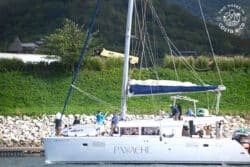 Panache Sailing Catamaran Tour – From Playa Flamingo Price: From: $75.00 +VATSelect optionsPlanet Dolphin
Panache Sailing Catamaran Tour – From Playa Flamingo Price: From: $75.00 +VATSelect optionsPlanet DolphinPlanet Dolphin has a large catamaran that leaves from Flamingo Marina. It’s a good option with kids since it’s fully enclosed or if you get seasick because the boat is wide and sturdy. The tour offers a good lunch and serves premixed drinks (more limited than other options). The afternoon/sunset tour has a party atmosphere.
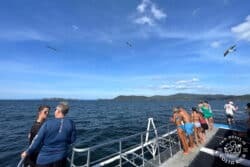 Planet Dolphin Catamaran Tour – From Playa Flamingo Price: From: $80.00 +VATSelect options3. Surf Lessons in Tamarindo
Planet Dolphin Catamaran Tour – From Playa Flamingo Price: From: $80.00 +VATSelect options3. Surf Lessons in TamarindoSurfing is another top reason why people visit Tamarindo.
Tamarindo Beach is great for experienced surfers but also if you have never done it before. It has smaller waves that are just the right size for learning to surf, which makes it an ideal spot for first-timers and families.
Our kids recently did lessons and our five-year-old was up on the board almost right away!
Check out this video of our son’s first time surfing.The surf company we used has wonderful instructors, especially for people new to surfing. They’re very safety conscious, patient, and can get most people up riding waves by the end of the lesson.
Book a surf lesson through the shop we used using the link below.
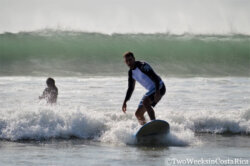 Surf Lessons – From Tamarindo Price: From: $50.00 +VATSelect options4. Mangrove & Estuary Boat Tour in Tamarindo
Surf Lessons – From Tamarindo Price: From: $50.00 +VATSelect options4. Mangrove & Estuary Boat Tour in TamarindoJust steps from the busy main area of town is the Tamarindo Estuary, part of Las Baulas National Marine Park.
A tour of this estuary is a great way to experience some of Guanacaste’s nature, which can be harder to find in this developed area.
On this boat tour, you’ll explore the peaceful estuary that divides Tamarindo and Playa Grande. The rich mangrove system is home to many different types of birds and animals. It’s one of the largest mangrove forests on the Guanacaste Coast.
On a tour, you can see wildlife like crocodiles, lizards, iguanas, and a variety of birds. We didn’t see howler monkeys when we did the tour, but the guide said it’s often possible. These tours have a very local feel because they are done with small operators.
For more information, read our post, Tamarindo Estuary Boat Tour.
 Beautiful scenery inside the mangroves near Tamarindo5. Apami Wildlife Center
Beautiful scenery inside the mangroves near Tamarindo5. Apami Wildlife CenterApami is a wonderful wildlife center just outside Tamarindo that rescues and rehabilitates wildlife that has been injured, orphaned in the wild, or held as pets. On a tour, you’ll learn more about their resident animals and have the chance to see them close up.
Some of the animals you may see are monkeys, big cats, a giant crocodile, tamarins, and birds like owls, Scarlet Macaws, and toucans. You’ll learn how each one arrived and how they are being helped.
Our whole family really enjoyed the tour, especially because of our guide who was engaging, knowledgeable, and passionate about wildlife conservation.
 Our family on the guided tour at Apami Wildlife Center
Our family on the guided tour at Apami Wildlife CenterBook a tour at Apami Wildlife Center using our link below.
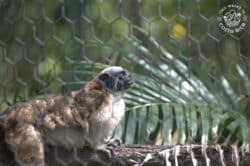 Apami Wildlife Rescue Center – From Tamarindo Price: From: $36.00Select optionsDay Trips from Tamarindo
Apami Wildlife Rescue Center – From Tamarindo Price: From: $36.00Select optionsDay Trips from TamarindoHere are a few options for day trips from Tamarindo that are worth the drive.
6. Llanos de Cortez WaterfallLlanos de Cortez is a beautiful waterfall about two hours from Tamarindo.
This is one of the most picturesque waterfalls in Costa Rica. The waterfall is wide and wispy and has a nice pool at the base that’s perfect for swimming. There’s also a sandy “beach” area to hang out and take pictures.
 The gorgeous Llanos de Cortez
The gorgeous Llanos de CortezIf you’re traveling to Tamarindo with kids, Llanos de Cortez is an especially good option. It’s easy to access (just a five-minute walk down some stairs) and the waterfall pool has shallow spots. Our kids love exploring the natural river as well. Learn more with our blog post.
If you’re making a day of it, you could pair the Llanos de Cortez with a stop at Las Pumas Rescue Center, a well-known wildlife rehabilitation center in the same area.
7. Day Trips to Nearby BeachesPlaya ConchalPlaya Conchal is an easy day trip north of Tamarindo (about 30 minutes).
Conchal is a gorgeous beach with sand made of tiny crushed shells. The water is a pretty turquoise color and the swimming is usually good.
You can snorkel along the rocks at the very northern end if conditions are right. Some vendors sell snacks and souvenirs on the beach, and you can rent a chair, umbrella, and snorkel/mask if you don’t have your own. Read our Playa Conchal post for important information about access.
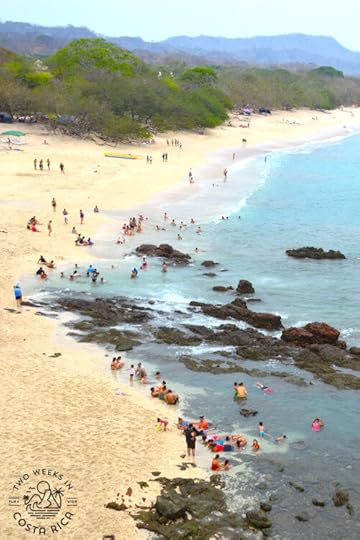 The gorgeous Playa ConchalPlaya Avellanas
The gorgeous Playa ConchalPlaya AvellanasThis is a more off-the-beaten path beach with a really laid-back vibe. It’s also popular with surfers because it’s less busy. You’ll have to drive on dirt roads through small towns to get there so it’s kind of an adventure (but road conditions are fine).
Avellanas is a nice spot because it is uncrowded and has a chill restaurant/bar right on the sand called Lola’s that has good food, drinks, and atmosphere. Learn more with our blog post on Playa Avellanas.
 The laid back Playa Avellanas, just south of Tamarindo8. Palo Verde National Park
The laid back Playa Avellanas, just south of Tamarindo8. Palo Verde National ParkFor nature lovers, we highly recommend this two-hour boat tour along the pristine wetlands of the Tempisque River.
Along with a knowledgeable bilingual naturalist guide, you will explore the ecosystem of this river and wetland system. A lot of wildlife is typically spotted, especially monkeys, as well as crocodiles, iguanas, and many types of birds. Bird species that have been spotted include Jabiru, osprey, white ibis, tiger herons, and scarlet macaw parrots.
The tour is on a comfortable covered boat, good for all ages. We did it when one of our kids was a baby.
After the boat tour, you will go to a farm in the country for a traditional lunch cooked over a wood stove. Learn more with our blog post.
 Traditional lunch on the Palo Verde National Park tour
Traditional lunch on the Palo Verde National Park tourBook a Palo Verde tour through the tour company we used with the link below.
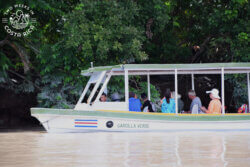 Palo Verde Boat Tour: Wildlife & Culture (from Guanacaste) Price: From: $126.00 +VATSelect options
Palo Verde Boat Tour: Wildlife & Culture (from Guanacaste) Price: From: $126.00 +VATSelect options
 Palo Verde Boat Tour: Wildlife & Culture (Private from Guanacaste) Price: From: $174.00 +VATSelect options9. River Float Tour to See Wildlife
Palo Verde Boat Tour: Wildlife & Culture (Private from Guanacaste) Price: From: $174.00 +VATSelect options9. River Float Tour to See WildlifeThis is another great opportunity to see wildlife by boat. On an inflatable raft, you will explore the tropical dry forest of the lower Tenorio or Corobici River.
As you float along the calm water, your nature guide will point out birds and animals. During our float trip, we saw monkeys, crocodiles, bats, a river otter, and many types of birds. You’ll also learn about the interesting plants and trees along the riverbanks.
 Howler monkey we saw on the river float
Howler monkey we saw on the river floatThe river is mostly flat and calm but there’s a bit of adventure when you pass a couple of fun Class I or II rapids.
On the way back to your hotel, you’ll also stop at the gorgeous Llanos de Cortez Waterfall (see above).
Book a river float tour through our link below.
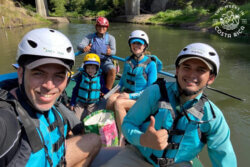 River Float Wildlife Tour + Llanos de Cortez Waterfall (Group Tour from Guanacaste) Price: From: $133.00 +VATSelect options
River Float Wildlife Tour + Llanos de Cortez Waterfall (Group Tour from Guanacaste) Price: From: $133.00 +VATSelect options
 River Float Wildlife Tour + Llanos de Cortez Waterfall (Private Tour from Guanacaste) Price: From: $170.00 +VATSelect optionsTamarindo Activities: What to Skip and WhyIs zip lining in Tamarindo worth it?
River Float Wildlife Tour + Llanos de Cortez Waterfall (Private Tour from Guanacaste) Price: From: $170.00 +VATSelect optionsTamarindo Activities: What to Skip and WhyIs zip lining in Tamarindo worth it?Unless you’re only going to Tamarindo on your trip, save the zip lining for another destination like La Fortuna, Monteverde, or Manuel Antonio, where the zip lines are much more elaborate and have better views (e.g., volcano, cloud forest, rainforest). The Guanacaste region just doesn’t have the same dramatic canopy experiences as these other destinations.
Can you see turtles nesting in Tamarindo?Even though some websites make it sound like you can go turtle watching at Playa Grande, not very many leatherback turtles nest here anymore. Unfortunately, they are endangered and have few numbers.
If you want to go turtle watching, the best place is Playa Ostional for arribadas (mass nesting events that happen occasionally). Playa Ostional is in Guanacaste (like Tamarindo) but about two hours away, so it’s better to stay nearby in Nosara to access it.
Another option if it makes sense for your itinerary is Tortuguero on the Caribbean coast. Tortuguero Beach is a renowned ecotourism destination and is especially known for sea turtles. We did a night tour there and got to see a green sea turtle mother make her way to the shore to lay eggs.
Keep in mind that the best time for turtle watching in Costa Rica is during the rainy season (May through November).
ConclusionThe main draw of Tamarindo is definitely its gorgeous beach so it should be no surprise that the most popular things to do focus on the ocean. Surfing the waves, sailing the coastline, or just relaxing on the sand is what draws so many visitors to this popular beach town. By focusing on these experiences, you’ll make the most of what this beach town does best. For those with more time, you can sprinkle in some other nature-based activities or day trips. We hope this guide helped narrow your search!
Tamarindo Travel InformationBelow is some general info about traveling to Tamarindo. For more details about accommodations, restaurants, and other travel essentials, check out our full Tamarindo destination guide.
Best Time to VisitTamarindo is a great destination year-round.
For weather, the dry season (December through April) is typically hot and sunny, but it’s also the most crowded and expensive time of year.
For those considering travel in March or April, keep in mind that these months are usually very dry. The landscape turns brown due to a lack of rain and there can even be forest fires.
The rainy season (May through November) has more rain (mostly in the afternoon/evening), but the forest is lush, green, and beautiful. You’ll also find fewer tourists and lower prices.
September and October are typically the rainiest, though we have traveled to Tamarindo in September and had great weather.
 Tamarindo looking lush in rainy seasonBooking Tours
Tamarindo looking lush in rainy seasonBooking ToursDuring high season (December through April), we recommend booking tours at least two weeks in advance. Popular tours, like catamarans, often sell out, especially over the holidays.
In rainy season, last-minute bookings are usually possible, but we still suggest reserving at least a week before to ensure availability.
If you book through our website, we’ll handle all the arrangements for you and can answer any questions you have.
Where to StayTamarindo offers accommodations for all budgets and preferences, from luxury beachfront resorts and boutique hotels to affordable hostels and vacation rentals.
If you’re traveling without a car, we recommend staying near the main area of town for easy access to restaurants and amenities. Couples might prefer to stay in quieter Playa Langosta. For families, there are lots of options for family-friendly hotels or condos with multiple bedrooms.
 Beachside pool in TamarindoGetting Around
Beachside pool in TamarindoGetting AroundTamarindo’s main area is walkable, but a rental car is good to have if you’re not staying right in town. It’s also nice for exploring nearby beaches and attractions. Be sure to check out our Rental Car Discount through one of Costa Rica’s most reliable companies to save 10% and get free extras.
Taxis are readily available if you’re not renting a car, and many tour operators provide transportation for excursions. Golf carts also can be rented to get around locally.
DiningTamarindo has one of the most vibrant dining scenes in Costa Rica.
From casual beach bars to upscale restaurants, it offers a bit of everything. You’ll find lots of fresh seafood, traditional Costa Rican cuisine, and international fare.
Keep in mind that restaurant prices are some of the highest in the country. If you’re on a budget, there are a few local sodas (traditional Costa Rican restaurants) and more affordable cuisine at El Mercadito (outdoor food court).
Many restaurants are located right on the beach. Be sure to make a reservation for sunset.
MoneyMost businesses in Tamarindo accept credit cards, but it’s good to carry some cash for smaller vendors and tips. Both colones and US dollars are widely accepted. ATMs are available in town. Check out our Money Matters post for more information.
Pin This Article for Later

Playa Grande: A Peaceful Sun and Surf Destination – Just across the estuary from Tamarindo is the chill surf community of Playa Grande, another great beach town in Guanacaste.
Samara: Guanacaste’s Most Overlooked Beach Town: Looking for a smaller beach town? Check out Samara, which is less developed but still has a good amount of amenities. It’s one of our favorites!
La Fortuna: What to Expect – For rainforest and lots of adventure activities, check out La Fortuna/Arenal. This popular destination pairs well with Tamarindo.
The post 9 Best Things to Do in Tamarindo & What to Skip appeared first on Two Weeks in Costa Rica.
April 10, 2025
Botanika Osa Peninsula Review: Our Stay in Puerto Jimenez
Two Weeks in Costa Rica |
Our family recently stayed at Botanika Osa Peninsula in Puerto Jimenez. We have visited Puerto Jimenez many times during our years living in Costa Rica, so we were curious about this newer luxury option, especially for such a remote spot. This was our second time staying at the hotel. Here’s our take on the resort and what you can expect.

Note: This is an unbiased review based on our two stays at Botanika Resort. We paid for our stays and received no compensation. We share our honest opinions to help you plan your trip.
OverviewSet in the lush rainforest of Costa Rica’s remote Osa Peninsula, Botanika Resort is a beautiful mid-size property that opened in 2022 as part of the Hilton’s Curio Collection.
The resort has about 125 rooms spread across four buildings. The property has a luxury feel but architectural features like large windows, wide verandas, and native gardens help it blend into the gorgeous natural surroundings. Throughout the grounds, mature trees create a jungle feel, and you’ll likely spot wildlife right on the property.
 Beautiful mango tree outside the main restaurant
Beautiful mango tree outside the main restaurantThe resort has great amenities. We loved the large lagoon-style pool and posh cabanas. As is typical of a Hilton resort, Botanika Osa Peninsula has restaurants onsite, a spa, and well-equipped fitness center.
 Pool area at the resort
Pool area at the resortInterestingly, Botanika is the only high-end hotel in the small town of Puerto Jimenez. The resort feels a bit out of place in this modest fishing village, but it does offer local experiences that will let you get a taste of everyday life and experience the culture.
While the property doesn’t have ocean views (it’s slightly set back from the coast), the ocean is just a short 15-minute walk away.
This resort is perfect if you’re looking for a relaxing escape in nature or want to visit the famous Corcovado National Park. It’s also a great option for those traveling on Hilton points who want a true rainforest experience.
LocationThe most important thing to know about staying at Botanika is its location.
Since the Osa Peninsula is so remote, the drive from San Jose is about 6-7 hours. Many visitors opt to take small planes from San Jose to save time, but we personally don’t recommend this due to safety and reliability concerns.
If you’re up for driving, it’s a beautiful trip along the coastal highway. Since it is long, we recommend breaking up the journey with stops along the way (more on this later). If you’re renting a car, be sure to check out our rental car discount to save 10% and get free extras through one of Costa Rica’s most reputable rental companies.
Once at Botanika, the closest town is Puerto Jimenez, which is about a 5-minute drive away. While Puerto Jimenez is a simple locals’ town with just a handful of streets, it does offer basic amenities. You’ll find a grocery store and other shops, bank with ATM, and a handful of simple restaurants serving mostly traditional Costa Rican food.
 The small town of Puerto Jimenez
The small town of Puerto JimenezFor many visitors, this remoteness is part of the appeal – it allows you to disconnect from the busy tourist areas and experience one of Costa Rica’s most pristine environments. You also can get a taste of the culture if you want by heading off the resort. We have visited Puerto Jimenez several times, staying both in and out of town, and have always felt safe.
Customer ServiceWe found the service at Botanika to be very good throughout our stays. Check-in was smooth and helpful, with welcome drinks of fruit punch (with optional local guaro liquor) and chocolates for the kids.
After check-in, a friendly bellboy took us to our room in a Tuk Tuk – a fun touch that our kids enjoyed.
Throughout our stays, we had good service in the restaurants, with attentive staff who were happy to help with special requests when needed.
Room Options at Botanika Osa PeninsulaThe rooms at Botanika are spread across four larger multi-story buildings, about a 5-minute walk from reception and the main restaurant.
During our two visits, our family stayed in a 2-bedroom suite and standard room, giving us a good perspective on the different accommodation options.
The rooms are tastefully decorated using local wood and furniture crafted by Costa Rican artisans. Large windows look out to the rainforest to bring the outdoors in. If you have a suite, the balcony is a wonderful place to hang out and take in the view.
 Our two-bedroom suite
Our two-bedroom suiteWe found our rooms to be very clean and quiet.
Standard rooms – Come with 1 king bed or 2 queens
Suites – Very spacious 1, 2, or 3 bedroom options with an open floor plan, large kitchen with full-size refrigerator and dishwasher, modern design, and private balconies.
PricingBotanika is definitely on the expensive side for Costa Rica. Prices vary seasonally, with the rainy season (May to November) offering the best rates.
In general, you can expect to pay $260-340 per night for a standard room and $375-800 per night for a suite. These rates include breakfast, which is optional. Check Rates and Availability at Botanika Osa Peninsula.
As with most hotels in Costa Rica, peak season pricing applies during Christmas/New Year’s and Easter Week, when rates can increase significantly.
PoolThe resort’s large, centrally located main pool was definitely a highlight for our family.
The lagoon-style pool loops around to create plenty of space, so it never felt too crowded. Palm trees and gardens surround the area, and the back of the pool faces the thick rainforest, creating a beautiful backdrop.
 Pool area with cabanas and loungers
Pool area with cabanas and loungersTwo large jacuzzis are available.
Many lounge chairs and umbrellas are spread out along the deck, making it easy to find a spot even during busy times.

Our family enjoyed getting a snack from the pool bar in one of the shaded cabanas.
 Our delicious snack of local patacones and enyucados
Our delicious snack of local patacones and enyucadosTowels, sunscreen, and after sun are available at the pool. They had a few floats/toys for the kids.
Open daily from 6 a.m. to 10 p.m.
Pool Bar/Restaurant (Driza Bar and Grill)The pool bar (Driza Bar and Grill) has a small, but good, menu with sandwiches, salads, burgers, tacos, nachos, etc. We appreciated that they incorporated local ingredients into many dishes, and the food for lunch was very good overall. Main dishes are $15-26, and there’s a full bar serving cocktails, beer, wine, and fruit smoothies.
For families, there’s a kids’ menu with a few options.
Driza Bar & Grill is open daily from 10 a.m. to 9 p.m. It’s the only lunch option on the property.
 Tacos from the pool barMain Restaurant (Tierra a la Mesa)
Tacos from the pool barMain Restaurant (Tierra a la Mesa)The resort’s main restaurant, Tierra a la Mesa, focuses on sustainably sourced ingredients. The menu isn’t huge but has pasta dishes, steak, local fish, and some specialties. There are limited vegetarian, vegan, and gluten-free options, though they can accommodate dietary restrictions upon request.
We found the restaurant to be expensive for what it was, with entrees averaging $30-35. Because of this, we often opted to eat at restaurants in town (get recommendations in our Puerto Jimenez post).
Tierra a la Mesa is open for dinner from 6 p.m. to 9:30 p.m.
Room service is also available, but only from 5:30 p.m. to 9:30 p.m.
BreakfastFor breakfast, Botanika offers an à la carte menu with things like traditional Costa Rican gallo pinto (rice and beans with eggs), omelets, eggs benedict, smoked salmon on toast, pancakes, and French toast, with typical sides like bacon, sausage, and fried plantains. Fresh tropical fruit is served to start.
 Our breakfast – smoked salmon with poached eggs
Our breakfast – smoked salmon with poached eggsThere’s also a self-serve area with breads, pastries, cereal, yogurt, and granola. Our kids loved the fresh local juices, while the adults enjoyed the Costa Rican coffee and mimosa bar.
Breakfast was inconsistent during our two visits. On one stay, it was excellent, while the other time, it was just okay. An example is that one day, we had delicious homemade hash browns, and the next day, we were given frozen ones. It’s still a decent option, though, and easier than going to town for breakfast. We would get it again for the convenience if we ever go back.
Breakfast is served at the main restaurant from 5:30 a.m. to 10 a.m. This is good because some tours start early in the morning.
Activities on SiteThere aren’t a lot of things to do right on the resort property. Botanika does have Insectopia, a small, but really cool, insect museum run by the BioSur Foundation, a local non-profit. Here, you can see displays with beautifully preserved butterflies, beetles, and other less common insects.
 Butterflies at Insectopia
Butterflies at InsectopiaThere are also short trails through the rainforest where you can spot wildlife.
The real draw is the activities available in the Puerto Jimenez area.
These are mostly nature tours like day trips to Corcovado National Park or the Rio Nuevo Nature Reserve, chocolate tours, dolphin watching, sloth tours through a local family, mangrove kayaking, and boat tours in the Golfo Dulce for snorkeling.
Corcovado day trips typically start early (around 6 a.m.) and return in the late afternoon, so plan for a full-day excursion if this is on your list.
 A beautiful spider monkey we saw near Corcovado
A beautiful spider monkey we saw near CorcovadoOther options include birdwatching, surfing in Cabo Matapalo (about 30 minutes south), and if you’re up for some adventure, visiting King Louis Waterfall.
Sportfishing is very popular in Puerto Jimenez. Botanika has a relationship with Crocodile Bay, the former hotel that was on the property for many years. They specialize in sportfishing and have a very good reputation (we’ve had clients go and they loved it).
Crocodile Bay also runs the tours desk at Botanika. In our opinion, some of the tours offered are overpriced, but the resort coordinates all the transportation and logistics, which makes things easy.
For more information about what to do in the area, read our destination guide for Puerto Jimenez.
Beach AccessWhile Botanika doesn’t have direct beach access, Playa Platanares (also known as Playa Preciosa) is nearby.
 The gorgeous Playa Platanares
The gorgeous Playa PlatanaresThe resort offers a free excursion where they will take you by boat (short 5-10 minute ride) to Cahui Beach Club. This is a small private resort with loungers right on the sand and a restaurant that serves simple, but good, food.
Playa Platanares is gorgeous (very wild feeling) and peaceful. Towels and basic shower facilities are available for Botanika guests.
 Finding a good spot at the beach club
Finding a good spot at the beach clubThe main beach in Puerto Jimenez (about a 5-minute drive from Botanika) is also very scenic if you want to explore on your own. It has calm water that’s great for swimming and is a popular spot among locals.
 The calm main beach in Puerto JimenezPier and Golfo Dulce
The calm main beach in Puerto JimenezPier and Golfo DulceA 15-minute walk along the jungle trails at Botanika takes you to a pier over the Golfo Dulce.
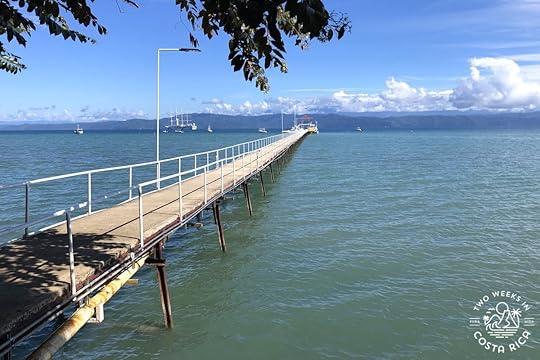 The pier on the resort property
The pier on the resort propertyThe Golfo Dulce is a tropical fjord, a unique geological formation that is extremely rich in marine life. It’s one of only a few tropical fjords in the world and definitely worth exploring.
Our family did a dolphin tour with a local operator, and it was awesome! In addition to dolphins, humpback whales also migrate to this area seasonally to breed and rear young.
 A dolphin jumping out of the water on our boat tour
A dolphin jumping out of the water on our boat tourDuring our stay, we were also lucky enough to spot dolphins right from the pier.
If you are interested in the dolphin tour we did, we’d be happy to help with the arrangements. Learn more and book a tour. Booking through us costs the same and helps support our website. Learn more about our travel agency.
SpaThe spa offers massages and facials for around $85-95 for a 50-70 minute session and $105-180 for 50-80 minutes.
Fitness CenterWe were impressed by Botanika’s very large, modern fitness center, which we used during our stay. It has several treadmills, bikes, ellipticals, yoga mats, weightlifting equipment, and free weights. The facility is air-conditioned.
The fitness center is open 24 hours a day with your room keycard.
Lounge/Game RoomNear the Reception and main restaurant is a comfortable lounge/library with a nice ambiance. It’s a good place to relax with a book. They also have some board games if it’s raining or you need to entertain the kids.
WifiThe free Wifi was strong in our rooms and throughout the resort.
Amenities for KidsThe pool is great if you’re traveling with kids. There’s a shallow area for young children and the rest of the pool isn’t super deep.
As mentioned, the lounge has some board games.
During one of our stays in high season (January), there was a local woman working (“Mama”) who came to talk to our kids and make them feel welcome. She made them cute pillow stuffed animals, which they loved. She wasn’t there during our stay in off-season (June).
Both restaurants have a kids’ menu.
SustainabilityBotanika Osa Peninsula has attained the Certification of Sustainable Tourism in Costa Rica. This is given to tourism businesses that have taken specific actions to mitigate their environmental impacts while advancing social, cultural, and economic goals.
The resort supports a local non-profit called BioSur that works to preserve ecosystems on the Osa Peninsula. They also run an internship program for local high school students, organize tree plantings, and offer educational workshops to the local community. The resort’s architecture is LEED Certified, and they’ve planted native species throughout the property.
Value for MoneyConsidering Botanika’s remote location, high-end amenities, and quality of accommodation, we found it to be a reasonable value within its luxury category. That said, it’s definitely not a budget option, and the restaurant prices in particular were high relative to the quality.
If you’re a Hilton Honors member using points, the property is a great option to explore this remote and special area of Costa Rica.
Best ForBotanika Osa Peninsula is best for:
Wildlife enthusiasts who want to see some of Costa Rica’s most sought-after speciesTravelers looking to visit Corcovado National Park with comfortable accommodationsHilton Honors members wanting to use points in a unique, off-the-beaten-path destinationFamilies wanting a luxury resort experience while still experiencing authentic Costa RicaThose seeking a balance between rainforest immersion and modern amenitiesThe resort is less ideal for:
Budget travelers (there are much more affordable options in Puerto Jimenez)Those seeking a walkable beachfront locationVisitors wanting extensive on-site activities or entertainmentFoodies looking for diverse dining options (the onsite restaurants are limited, though you can find some basic alternatives in Puerto Jimenez)Pros and Cons of Botanika Osa PeninsulaPros:Beautiful, modern resort in one of Costa Rica’s most biodiverse regionsExcellent wildlife viewing on and near the propertyGorgeous lagoon-style pool with good serviceLarge, well-designed rooms with rainforest viewsFree excursion to a beautiful, uncrowded beachGreat fitness centerCons:Remote location requires significant travel timeHigher price point than many optionsRestaurants are expensive and options are limitedNot really walkable to town, requiring transportationLimited on-site activities compared to some resortsGetting to Botanika Osa PeninsulaSan Jose International Airport (SJO) is the best option to fly into when visiting Botanika Osa Peninsula. From there, you have three choices for local transportation.
Small PlaneThis is a popular option that saves time (about a 50-minute flight), but as mentioned, we don’t personally recommend it for safety and reliability reasons.
DrivingThe drive from San Jose to Puerto Jimenez is along well-maintained, paved roads.
We recommend renting a car and designing an itinerary that breaks up the drive from San Jose. Some possible stops along the route are:
Esterillos and Bejuco: Small towns about two hours from San Jose with a local feel.Manuel Antonio: A very popular, family-friendly beach town with many activities and amenities.Uvita/Dominical: More rural and off-the-beaten path, with thick rainforest and abundant wildlife, but still offering good restaurant options.Be sure to check out our rental car discount to save 10% on a car and get free extras.
Taking a ShuttleIf you’re not comfortable driving, you could take a private shuttle van. These are comfortable, air-conditioned vehicles with professional drivers. The cost is around $630 each way since it’s a long trip.
If you need help with the arrangements, we work with an excellent local transportation company and could help with stops on the way to break up the drive. Here’s a link to our Private Shuttles page with more info.
Best Times to VisitThe Osa Peninsula is located on the southern Pacific coast, one of the rainiest parts of Costa Rica.
The rainy season goes from May through the end of November, with the driest times being mid-December through April.
We have visited the Osa Peninsula many times during different seasons.
The dry season months are hot (into the 90s ℉/32 ℃) and typically have sunny skies and little rain, though you should always be prepared for the occasional downpour. On one of our visits in February, it rained for about an hour early one morning, which was a surprise. This is what keeps the rainforest so lush and vibrant, after all!
Early rainy season (May through July) is typically slightly cooler but still very tropical feeling. Mornings are usually nice with downpour-type rain in the afternoon or evening for an hour or two. Sometimes, it will rain more. During our last visit in mid-June, it rained on and off during our three-day visit. We were still able to do all the activities we wanted to, though.
August through mid-November can be quite rainy, depending on the year. For more information, check out our Weather post.
ConclusionBotanika Osa Peninsula offers a luxury experience in one of Costa Rica’s most pristine and biodiverse regions. While it requires some effort to reach, those looking to experience the unique nature of the Osa Peninsula while enjoying comfortable accommodations will appreciate what Botanika has to offer.
During our two stays, we really enjoyed the beautiful pool area, comfortable rooms, and friendly service. We also liked that the resort is near Puerto Jimenez. It was great to be able to eat at some of the local restaurants and have a more authentic stay.
If you’re a wildlife enthusiast, want to visit Corcovado National Park, or are looking to use Hilton points for a unique Costa Rica experience, Botanika is a great option.
Frequently Asked QuestionsIs Botanika Osa Peninsula on the beach?No, Botanika is not directly on the beach, but offers transportation to nearby beaches.
What are the closest major towns to Botanika?The main town area of Puerto Jimenez is about 1 mile (1.6 km) from the resort.Golfito is across the bay and can be accessed by taking the small ferry from Puerto Jimenez. It has duty-free shopping and a marina but doesn’t offer much for most travelers.The tiny village of Cabo Matapalo is about 30 minutes south via a dirt road and is known for great surfing and wild jungle. The road south of Puerto Jimenez that leads to Cabo Matapalo and Corcovado National ParkHow can I get to the main town area of Puerto Jimenez?
The road south of Puerto Jimenez that leads to Cabo Matapalo and Corcovado National ParkHow can I get to the main town area of Puerto Jimenez?Driving is the best way to get to town. Although you could walk (about 15-20 minutes), the resort is located on a dirt road next to the airstrip and is somewhat isolated. There are no safety concerns really, as long as you follow the usual precautions, so walking is possible if you’re up for it.
If you won’t have a car, the resort offers a shuttle to town for $10 per person each way. Taxis are also available.
Is there a grocery store in Puerto Jimenez?Yes, there’s a medium-sized store called BM that has a decent selection, including fresh produce, meat, and other essentials.
Is there a resort charge?Botanika Resort has a $35/night resort charge.
Can you see wildlife on the property?Yes! In the rainforest around the property, it’s possible to see scarlet macaws, iguanas, frogs, monkeys, and sloths. A stream runs through the resort, and the short trails near the pier are good for wildlife watching.
What should I pack for a stay at Botanika?Due to the hot, humid climate, we recommend packing moisture-wicking clothing, bug spray, sunscreen, a good hat, binoculars for wildlife spotting, and hiking boots if you’re planning on hiking. Also be sure to bring a light rain jacket.
If you’re traveling during the rainy season, have an umbrella handy. Because it can feel cooler because of the humidity when it rains, you may want lightweight pants as well.
For a complete packing list, check out our Costa Rica Packing List.
Are there other high-end accommodation options in the Osa Peninsula?If you prefer a smaller, boutique-style luxury lodge, Lapa Rios is a good option. It offers a more intimate experience in a similar setting. Learn more with our Cabo Matapalo post.
On the other side of the peninsula, Drake Bay offers many more high-end options with a similar environment.
Is parking free?Yes, parking is free, or you can use the valet service for $10 per day. The lot is very close to Reception.
Check in and outCheck-in is at 3:00 p.m. and check-out is at 11:00 a.m.
Pin It for Later

This review is based on our family’s personal experience at Botanika Resort. We paid for our own accommodations and received no compensation or special treatment in exchange for this review. Our goal is to provide honest, unbiased information to help travelers make informed decisions about their Costa Rica accommodations.
Please note that if you book a stay at Botanika using one of our links to booking.com above, we receive a small commission at no extra cost to you. Read our Privacy Policy for more information.
Have a question about Botanika Osa Peninsula or have you been? Leave a comment below.Looking for more information about Costa Rica? Check out these posts:First-time Visit to Costa Rica: If you’re visiting for the first time, learn what to expect and get general trip-planning tips.
Puerto Jimenez: An Outpost to the Osa – Get all the details about the small town of Puerto Jimenez, including recommended restaurants.
Renting a Car in Costa Rica: Clearing Up the Confusion – Not sure about renting a car? Check out our article that explains how insurance works in Costa Rica and what pitfalls to avoid.
The post Botanika Osa Peninsula Review: Our Stay in Puerto Jimenez appeared first on Two Weeks in Costa Rica.
March 28, 2025
Hotel Review: Arenal Springs Resort & Spa, La Fortuna
Two Weeks in Costa Rica |
Our family recently stayed at Arenal Springs Resort and Spa in La Fortuna, Costa Rica. In this post, we’ll give an overview of what the property is like and share our experience spending three nights at this popular hot springs resort.
Note: This is an unbiased review based on our personal experience. We paid for our stay and received no compensation. We share our honest opinions to help you plan your trip.

Arenal Springs Resort and Spa is a beautiful property with views of Arenal Volcano and natural hot springs right onsite.
This mid-size hotel has around 100 rooms (bungalow style) spread throughout the property. It has lots of amenities, including four different restaurants, hot springs, a swimming pool, spa, fitness center, and activities for kids. All the rooms at Arenal Springs Resort have air conditioning, and the price includes a nice breakfast.

Although it’s a resort, Arenal Springs still has a Costa Rican touch, which we really liked. The property is also very family friendly. We were traveling with our kids who were 9 and 5 at the time and everyone loved the hotel.
Location and Volcano ViewsArenal Springs Resort is in a good location, only about 10 minutes from downtown La Fortuna on a quiet side road.
Tip: Since La Fortuna is more spread out, it’s nice to have a rental car to get to restaurants in town and area attractions. If you decide to rent a car, be sure to check out our discount to save 10% through one of the most reputable rental companies in Costa Rica.
The resort has great volcano views (weather permitting). When we visited in mid-December, we were only able to see the volcano’s base because of clouds, which is common during certain times of the year. See the When to Visit section, below, for more information.
 Arenal Volcano partially covered in clouds during our visit in mid-December
Arenal Volcano partially covered in clouds during our visit in mid-DecemberArenal Springs Resort is about 2.5 hours from Costa Rica’s largest international airport in San Jose and 2.5 hours from the airport in Liberia.
Customer Service and Check-inThe Arenal Springs staff provided excellent service during our stay.
Before we arrived, the resort contacted us through WhatsApp, sending helpful information about the hotel. They also asked about any dietary restrictions and if we had sensitivity to cleaning products, which we appreciated.
The check-in process was fast and friendly. They had a menu of welcome drinks with wine, beer, and signature cocktails. The kids got some fun non-alcoholic drinks that were quite fancy and they loved.
During check-in, we were given bracelets, which unlocked our room electronically.
After having the welcome drinks, a friendly reception worker took us to our room in an electric golf cart, which was really fun. During the short drive, he gave more information about the resort and pointed out some of the amenities.
Room Options at Arenal Springs Resort and SpaThe rooms at Arenal Springs are spread out on four main “streets.” One small road leads from Reception to the rooms. The property isn’t huge so it’s only a short walk to Reception or the hot springs (around five minutes or less) from just about any room.
Junior SuitesThese are bungalows with one unit on each side. They have either two queen beds or one king. A rollaway bed can be added to accommodate five people. This makes it one of the only hotels in La Fortuna that allows families with five people to stay in the same room.
 One of the Junior SuitesMaster Suites
One of the Junior SuitesMaster SuitesThe Master Suites are larger two-bedroom units that can hold up to ten people. These have better amenities, including a jacuzzi with natural hot springs water.
Room PricesArenal Springs is at the high end of mid-range for La Fortuna. Prices vary seasonally, with the rainy season (May to mid-November) offering the best rates.
In general, you can expect to pay $250-425 per night for a Junior Suite (double occupancy) and $935-1,100 per night for a Master Suite (based on 4-person occupancy).
The peak season, when prices are highest, is during Christmas/New Year’s and Easter Week.
Check current rates and availability at Arenal Springs Resort.
Room AmenitiesWe booked a Junior Suite, which was comfortable, though the decor was basic and could have used some updating. The beds had good mattresses and linens.
In the room, we had a TV, ceiling fan, A/C, coffee maker, and mini-fridge with drinks. The bathroom was decent-sized but rather rustic. The shower had a clothesline to dry bathing suits.
We enjoyed our outdoor terrace with volcano views (although partially clouded).
Rooms were very clean with daily housekeeping, and our kids loved the fun towel animals the staff created each day.
 Our room (a Junior Suite)Hot Springs
Our room (a Junior Suite)Hot SpringsThe resort has several hot springs centrally located near Reception. These are naturally heated by Arenal Volcano, with temperatures ranging from 34-39 °C (93-104 °F).
 The main hot spring pool
The main hot spring poolTwo large hot spring pools have swim-up bars and outdoor restaurants right there. A full bar is available, serving cocktails, wine, beer, and fresh fruit smoothies. One of the large pools is adults-only. The pools are made of concrete but have a natural feel with river rocks and lots of tropical plants.
 Adults-only pool and swim up bar
Adults-only pool and swim up barBranching off from the main area are several smaller hot springs and a Jacuzzi. Some of these are set off on their own so more private.
We enjoyed going to the hot springs at night after doing activities during the day. Unlike many other popular resorts in La Fortuna, only hotel guests can use the hot springs at Arenal Springs Resort—they don’t allow visitors on day passes. This meant it never felt crowded during our stay (mid-December).
 The hot springs at night
The hot springs at nightThere are many lounge chairs around the pools and some cabanas with pretty, flowing privacy curtains.
The pools are open from 8 a.m. to 10 p.m.
 One of the areas near the hot springs with loungers and cabanasSwimming Pool
One of the areas near the hot springs with loungers and cabanasSwimming PoolThe resort has a large cool water swimming pool. This is perfect for kids or if you need a break from the hot springs.
Restaurants at Arenal Springs Resort and SpaOptionsArenal Springs Resort has four restaurants and a café.
Ti-Cain Restaurant – Main restaurant. Indoors. Open for dinner only, 6-9:30 p.m. Big menu with a lot of local seafood and meat dishes.
Segreto Restaurant – Located next to Reception (indoors). We didn’t eat here, but it has Italian food (brick-oven pizza, salads, charcuterie, pastas).
 The Italian restaurant
The Italian restaurantSakana Sushi Bar & Restaurant – Located at the hot springs. We ate here and loved it. Excellent service and food. They were very helpful in accommodating our dietary restrictions. In addition to sushi, they have ramen, poke bowls, and noodle dishes. The chef made it really fun for the kids with spiralized carrots that were part of our sushi boat. Open 10 a.m. – 9:30 p.m.
 Our fun sushi boat
Our fun sushi boatLas Iguanas Snack Restaurant – At the hot springs. Casual options like hummus, guacamole with chips, nachos, tacos, sandwiches, and burgers, plus kid-friendly food like chicken fingers and hot dogs.
Kahui Coffee Shop – Great spot for coffee connoisseurs. They can prepare it in many different ways, including the Costa Rican chorreador or Vandola method. Also has pastries and sweets. Open 10 a.m. – 6 p.m.
Dietary Restrictions and Vegetarian OptionsThe menus had options that were gluten free, soy free, nut free, dairy free, mollusk and crustacean free, vegetarian, and vegan.
Ti-Cain restaurant had a good-sized menu with limited vegetarian and vegan options, though there were many choices for pescatarians.
The Italian restaurant (Segreto) had good options for vegetarians; limited vegan.
Sakana (sushi restaurant) was probably the best option for vegetarians and vegans. We counted at least six good choices (e.g., vegan poke bowl, vegetarian rolls, and tofu curry).
Restaurant PricesThe restaurant prices at Arenal Springs are very high by Costa Rican standards. Though the food we had was great, we sometimes drove to town for more reasonably priced options (see our La Fortuna destination guide for recommendations).
Entrees at the main restaurant (Ti-Cain) – $30-47. At the Italian restaurant (Segreto), entrees were $23-39.
At the sushi restaurant, rolls ranged from $13-21; other mains were $20-30.
The Snack Restaurant (Las Iguanas) was $9-28.
BreakfastA breakfast buffet is included in the room rate, and the quality was excellent.
They had everything you would expect, including traditional foods plus more upscale items like frittatas, oatmeal pancakes, chorizo meatballs, and yucca hashbrowns. Homemade breads (both sweet and savory), pastries, and cereals were available, along with fresh juices and of course, good Costa Rican coffee.
All items were clearly labeled. They also had a made-to-order egg station.
Breakfast runs from 6:30-9:30 a.m. daily.
 Breakfast buffetSpa
Breakfast buffetSpaThe resort’s spa offers massages (starting at $80 for 45 min.) as well as scrubs, facials, and masks ($70-100).
Treatments take place in garden-view bungalows that accommodate 1-3 people.
GymThe fitness center had 2 spin bikes, 4 other stationary bikes, free weights, a weight bench, a rowing machine, 1 elliptical machine, and 2 treadmills when we visited.
The gym is a large, air-conditioned space. It’s open from 6 a.m. to 8 p.m. daily.
 Fitness centerYoga Platform
Fitness centerYoga PlatformNear the spa is an open-air yoga platform with beautiful wood decking. The resort offers a free yoga class every day at 6:30 a.m.
 Yoga platformFamily-Friendly Amenities
Yoga platformFamily-Friendly AmenitiesArenal Springs Resort is a great option for families with both young kids and teens.
Kids Game RoomThe resort has a fun game room with foosball, air hockey, a play tent, toddler toys, and board games. It’s open from 6 a.m. to 8 p.m.
 Game roomOutdoor Playground
Game roomOutdoor PlaygroundThere’s a big play structure next to the swimming pool with a slide and swings for younger kids.
Games Near PoolsNear the locker room are a few things to keep the kids entertained like a giant Jenga game, Foos ball table, corn hole, and comfy Adirondack chairs. Our kids enjoyed this while we were waiting for dinner.
Outdoor Volleyball and Soccer FieldsThese are in the center of the property.
WifiThe WiFi at Arenal Springs was excellent in our room, around the pools, and throughout the property.
Souvenir ShopThe resort has a souvenir shop. It also stocks essentials you might need during your stay like sunscreen, insect repellent, and basic medications.
SustainabilityArenal Springs Resort has the Certification of Sustainable Tourism in Costa Rica. This means that the hotel actively reduces their environmental impacts, while advancing social, cultural, and economic goals.
On our visit, we saw this in action. The hotel recycles, uses energy efficient lighting and A/C (which didn’t affect our comfort), has solar hot water, composts, and has a biodigester.
They also have an agroecological (sustainable) farm. Here, they make organic fertilizer, reforest, and grow vegetables for their restaurants.
Nearby AttractionsThe resort’s location makes it convenient for exploring La Fortuna’s popular attractions:
Arenal Volcano National Park: 20-minute driveLa Fortuna Waterfall: 15-minute driveMistico Hanging Bridges: 20-minute driveLake Arenal: 25-minute driveValue for MoneyArenal Springs is in the mid to high-end price range for La Fortuna. Is it worth it? We thought so. The hot springs are just for hotel guests (no crowds from day passes), a nice breakfast is included, and the bungalows give you some privacy.
Having hot springs, restaurants, and activities right on the property is very convenient, especially if you’re traveling with kids.
 Our kids enjoying the hot springs
Our kids enjoying the hot springsIf you’re watching your budget and plan to be out exploring most days, you might be better off at a smaller place in town.
Pros and Cons of Arenal Springs Resort and SpaPros:Nice hot springs only for hotel guestsGood breakfast buffet includedBungalow-style rooms with good privacySeveral restaurants on propertyVery family-friendly with amenities for kids of all agesHelpful, friendly staffGood volcano views (weather permitting)Quiet location away from town noiseCons:Room decor is a little basic and could use updatingRestaurant prices are high even by tourist standardsNot within walking distance of townNeed taxis or a rental car to access La Fortuna and attractionsWhen to VisitLa Fortuna has different weather patterns than other parts of Costa Rica. It’s one of the rainier destinations (locals joke that it rains 366 days a year!). But it’s a rainforest after all.
December and January tend to be the rainiest months. September is considered to be the best time to see the volcano, making it a good option if you’re visiting during rainy season on the Pacific coast.
We have visited the Arenal area in March, June, and July during previous trips and had great weather, with mostly dry days.
 Arenal Volcano on a visit in MarchTransportation
Arenal Volcano on a visit in MarchTransportationArenal Springs Resort is about 2.5 hours from both San Jose Airport (SJO) and Liberia Airport (LIR).
The drive from either airport is on well-maintained paved roads. If you’re okay with driving in Costa Rica, we recommend renting a car to have more flexibility.
When arriving without a car, you can take a shuttle from the airport. If you need help with the arrangements, we work with an excellent local transportation company that provides private door-to-door service from the airport. From San Jose or Liberia, the cost is around $200-250 plus tax. Our Shuttles page has more information and reviews.
Once at the resort, you’ll need to take taxis to get to town if you won’t have a car (around $10-15 each way).
ConclusionArenal Springs Resort and Spa is a nice blend of comfort and authentic Costa Rican hospitality. The hot springs are the main highlight, with multiple pools nestled in beautifully landscaped gardens. While the restaurants charge higher prices than those in town, the food quality is good and the included breakfast buffet was a standout for us. For families looking for a resort with private hot springs and volcano views in La Fortuna, Arenal Springs Resort is a great choice.
Frequently Asked QuestionsAre the hot springs clean? Yes, the resort drains and cleans the hot springs every night and refills them in the morning.
Are the hot springs naturally heated? Yes, the hot springs are naturally heated by Arenal Volcano’s geothermal activity.
Is the resort handicap-accessible? Yes, the hotel has several handicap-accessible rooms that are located closest to the road inside the resort. The pools and restaurants are also accessible.
Do I need a car? Having a rental car is nice to have to get to other restaurants and gives you more flexibility with activities. But it’s not absolutely necessary. The resort is only about a 10-minute drive to town and most local tours include transportation.
Does the resort have a shuttle to town? No, Arenal Springs doesn’t offer a shuttle service to La Fortuna.
Is the hotel family-friendly? Yes! With amenities like a kids’ game room, playground, family pool, and kid-friendly menu options, Arenal Springs caters well to families with children of all ages.
Does Arenal Springs Resort have hiking trails on site? No, the resort does not have hiking trails on the property.
Will I see wildlife? The hotel property used to be farmland for cattle so much of it is open and unforested. For this reason, it’s harder to see wildlife but you can see many types of birds. We recommend doing some wildlife tours in the area. Some great options are a safari river float, sloth tour, or hanging bridges.
Is parking free? Yes, the resort has a large lot next to Reception. You also can drive your car directly to your room, as each bungalow has dedicated parking.
Is there a resort fee? No, Arenal Springs doesn’t charge a resort fee. Your nightly rate includes access to all the amenities.
Do the staff speak English? Yes, the staff at Arenal Springs generally speak good English.
Is the property guarded? Yes, there is a security guard station with a gate at the entrance.
Do they provide pool towels? Yes, you can get pool towels near the locker rooms by the hot springs.
What are the check-in and check-out times? Check-in is at 3:00 p.m. and check-out is at 12:00 p.m.
How far is Arenal Springs Resort from the airport? The resort is approximately 2.5 hours from both San Jose Airport and Liberia Airport.
How much does it cost to stay at Arenal Springs Resort? Junior Suites range from $250-425 per night (double occupancy), while Master Suites cost between $935-1,100 per night (4-person occupancy). Prices are higher during peak holiday seasons. Check current rates and availability.
Is there an adults-only section? There is no adults-only section for rooms, but some hot spring pools are designated as adults-only (18+).
Is room service available? Yes, you can get food from any of their restaurants delivered to your room for no extra charge.
Does the hotel do anything special for Christmas and New Year’s? When we were there in December, there were lots of outdoor decorations and Christmas trees. They also have special dinner events for Christmas Eve and New Year’s Eve.
 Christmas decorations in the main restaurant
Christmas decorations in the main restaurantIs smoking permitted? Per Costa Rican law, there is no smoking in the rooms or pools, but the resort does have a designated smoking area near the main parking lot.
Pin It for Later

This review is based on our family’s personal experience at Arenal Springs Resort & Spa. We paid for our own accommodations and received no compensation or special treatment in exchange for this review. Our goal is to provide honest, unbiased information to help travelers make informed decisions about their Costa Rica accommodations.
Please note that if you book a stay at Arenal Springs using one of our links to booking.com above, we receive a small commission at no extra cost to you. Read our Privacy Policy for more information.
Have a question about Arenal Springs Resort and Spa or have you been? Leave a comment below.Looking for more information about La Fortuna? Check out these posts:La Fortuna Hotel Guide: Not sure if Arenal Springs is right for you? Check out our full hotel guide for La Fortuna with many other options.
19 Unique Things to Do in La Fortuna: From hiking around the volcano and sloth tours to thrilling adventures like zip lining and canyoning, there’s something for everyone.
Parador Resort and Spa Review: Our Family Stay in Manuel Antonio – Read about our experience at this ocean-view resort with extensive jungle grounds, multiple pools, and great wildlife viewing.
The post Hotel Review: Arenal Springs Resort & Spa, La Fortuna appeared first on Two Weeks in Costa Rica.
March 18, 2025
Parador Resort and Spa Review: Our Family Stay in Manuel Antonio
Two Weeks in Costa Rica |
Our family recently stayed at the Parador Resort and Spa in Manuel Antonio, Costa Rica. In this post, we’ll give an overview of what the property is like and share our experience.
*Note: This is an unbiased review based on our personal experience. We paid for our stay and received no compensation. We share our honest opinions to help you plan your trip.

Set on a hillside point with beautiful ocean views, Parador Resort and Spa offers a good balance of comfort and nature in a private setting.
With 119 rooms spread throughout the large property, the Parador is one of the biggest resorts in Manuel Antonio. On our visit in March (high season), the hotel was fairly full but didn’t feel too crowded.
The hotel has an old world feel with antiques and artwork that show a bit about the country’s history and culture. You’ll find old wooden oxcarts, wooden carvings, paintings, and local metal work that add charm to the dining and common areas.
The main area near Reception is where you’ll find most of the amenities. This is where several restaurants, pools, a spa, and entertainment options like a game room are located.
 Path through the main area of the resort
Path through the main area of the resortWhat makes the Parador special is its expansive 130-acre property with lush rainforest and many mature trees. Right from the pool, we were able to spot squirrel monkeys, sloths, iguanas, toucans, and scarlet macaw parrots.
Parador is one of the most popular hotels in Manuel Antonio.
 A squirrel monkey we spottedLocation of Parador Resort & Spa
A squirrel monkey we spottedLocation of Parador Resort & SpaThe property sits at the end of a quiet road about 10 minutes from the main area of Manuel Antonio. Although it is set on its own, the resort itself has just about everything you need if you’re just looking for a relaxing resort stay.
Tip: Having a rental car would still be nice to have at the Parador so that you can easily get to restaurants in town (there are many great options) and attractions. If you decide to rent a car, be sure to check out our discount to save 10% through one of the most reputable rental companies in Costa Rica.
Parador Resort is about a 7-minute drive to Manuel Antonio National Park and 10 minutes from downtown Quepos, the nearest small city.
It’s about 2.5 hours from Costa Rica’s largest international airport in San Jose and 4.5-5 hours from the airport in Liberia.
Customer ServiceThe staff at Parador Resort were helpful and friendly throughout our stay.
At check-in, the front desk team was efficient and informative, giving us a clear overview of the resort’s amenities. We also used their WhatsApp chat option to ask about restaurant hours.
In the restaurants, servers were very nice and helpful in accommodating our dietary requests.
Even the ground workers made the effort to help us spot a sloth hiding in a tree.
We appreciated the nice gesture of having a cupcake and balloon in the room since we were there to celebrate Jenn’s birthday.
Room Options and PricingThe Parador has a range of room options from basic Garden rooms all the way to Suites with grand ocean views.
Garden Rooms: Entry-level option with terrace and forest views. We stayed in a Garden Plus room. It was basic (slightly old-fashioned) but clean and comfortable with a nice terrace overlooking the rainforest.Tropical Rooms: Located on second or third floors with partial ocean or jungle views depending on the room. More spacious than Garden Rooms.Premium Rooms: Situated in the main building with ocean views and private balconies.Vista Suites: Adults-only (18+) luxury option at the highest point on property with panoramic ocean views and upgraded amenities. The suites are a good option if you’re traveling as a couple or on your honeymoon. View from a Garden Plus room
View from a Garden Plus roomThe Parador is one of the more expensive hotels in Manuel Antonio. Prices range from $300-900/night in the high season (December-April) and $250-600/night in low season (May-November). Peak pricing applies during Christmas/New Year’s and Easter Week.
The nightly rate includes breakfast. Other meals are extra.
Parador doesn’t charge a daily resort fee.
Check current rates and availability at Parador Resort.
 Vista SuitesBeach Access
Vista SuitesBeach AccessThe hotel doesn’t have direct beach access, but beautiful Playa Biesanz is close by. Playa Biesanz is in a secluded calm cove that is perfect for swimming.
You can walk to this beach (about 15 minutes total) or have the staff take you in a golf cart to the trail entrance. From the road, it’s about a 10-minute walk through the forest to get to the beach. Playa Biesanz doesn’t have any amenities so be sure to bring everything you’ll need for the day.
The resort also offers a free shuttle service to the main beach in town, Playa Espadilla, on a regular schedule. The shuttle takes about 10 minutes to reach the beach, and the last return shuttle is around 5:30 p.m.
Playa Espadilla is a gorgeous palm-tree-backed beach with a lot of amenities around. You can rent beach chairs and tents, plus there are restaurants nearby.
 Playa Espadilla in Manuel AntonioPools
Playa Espadilla in Manuel AntonioPoolsThe pools were definitely a highlight of our stay at the Parador.
The large main pool is centrally located with a gradual depth that makes it good for families with kids of all ages. It has some fun water fountains and plenty of comfortable loungers around the perimeter.
This pool is in the full sun but there are some umbrellas for shade and a pool bar/restaurant with covered seating.
 The main pool
The main poolThere’s a rancho with a swim-up bar. Both alcoholic cocktails and fruit smoothies for the kids are available.
A couple of smaller, quieter pools branch off from the main one.
For adults seeking a peaceful environment, the resort has two adults-only pools – one centrally located and another at the Vista Suites (the adults only section of the property).
 Adults only pool
Adults only poolIf you’re traveling with young kids, there’s also a small shallow pool that is perfect with babies and toddlers. It’s under the trees in full shade.
 Baby and toddler poolRestaurants
Baby and toddler poolRestaurantsThe Parador has restaurants serving international cuisine, including steak and other meat dishes, seafood, pizza, sandwiches, burgers, salads, and pasta.
While we noticed some menu overlap between them, each restaurant had its own specialty – some emphasize fresh seafood, others quality meats. We really enjoyed the sushi restaurant.
The restaurants accommodate dietary restrictions with clearly marked gluten-free, vegetarian, vegan, and dairy free options, though choices become somewhat limited with multiple restrictions.
During our stay, one of us needed both vegetarian and lactose-free options, which was a little challenging. Fortunately, the staff was helpful, checking about allergies and restrictions in advance and working with the kitchen to create dishes that would work.
Something unique if you’re celebrating a special occasion like an anniversary or birthday is La Reina (the Queen) room. This is an elegantly decorated private dining space that you can rent.
 The special events dining room
The special events dining roomParador also has a coffee bar with espresso drinks and sweet treats near the main restaurant.
Room service is available from 6 am to 11 pm.
We found the restaurant prices to be quite high by Costa Rican standards (lunch $15-30, dinner $20-58), but the quality of the food was good.
If you’ll have a rental car, we’d recommend checking out some of the many other restaurants in town, most of which are less expensive (See our Manuel Antonio Restaurant Guide).
You can find full menus of the resort’s restaurants on Parador’s website.
Parador’s restaurants do not have a dress code.
BreakfastA highlight of staying at the Parador is the included breakfast buffet.
They had quite a bit to choose from, including traditional gallo pinto (rice and beans), eggs prepared various ways, bacon or sausage, pancakes, assorted breads, cereals, and lots of options for fresh tropical fruit. There’s also a made-to-order omelette station.
Breakfast is served at the main restaurant. This space is open air and overlooks the ocean.
 The main restaurant where breakfast is served
The main restaurant where breakfast is servedBreakfast hours run from 6 a.m to 10 a.m.
Hiking TrailOne of the unique features of the Parador is its on-site jungle trail, aptly named the Monkey Trail.

This well-maintained path takes you through the rainforest and leads to a few scenic viewpoints. The trail offers different loops depending on how much time you want to spend exploring.
 The trail map
The trail mapDuring our stay, we opted for one of the shorter loops, which took about 15 minutes. While the forest scenery was the focus, we did get a beautiful ocean view at one point on the trail.
 Ocean view from the trailSpa
Ocean view from the trailSpaWe didn’t have spa treatments during our visit but checked out the space and talked to the staff.
The services menu includes massages, facials, body wraps, and even mini services designed for kids.
The spa features a comfortable room for couples’ massage as well as a larger single-person room with jungle views.
For pricing, massages and facials range from around $60 for 25-minute sessions to $105-130 for longer 50-80 minute treatments. They also offer manicures and pedicures.
 One of the spa treatment roomsYoga Platform
One of the spa treatment roomsYoga PlatformBehind the spa is a large yoga platform overlooking the serene rainforest. The resort provides yoga mats for guests to use.
Parador offers free yoga classes on Tuesday and Thursday mornings at 9 a.m.
GymThe resort’s medium-sized fitness center offers enough equipment for a good workout during your stay.
The air-conditioned space has two treadmills, one recumbent bike, two spin bikes, an elliptical machine, and free weights.
 Fitness centerPickleball Court
Fitness centerPickleball CourtThe Parador has a well-maintained outdoor pickleball court under the shade of the trees.
WifiThe Wifi in our room was very fast and had a strong signal. It also worked well in the pool areas and pretty much everywhere we tried it on the main hotel grounds.
Family-Friendly ActivitiesMini Golf CourseOur kids really enjoyed the short mini golf course, which has around 9 holes.
Located under a canopy of trees near the main pool, it was a fun way to spend an hour or so.
Kids Play RoomFor younger children, the Parador has the Pura Vida Playhouse.
This dedicated kids’ playroom for ages 2-6 has toys, rocking horses, and art tables. It would be a good spot if you need an activity for a couple of hours or if it’s raining.
 Kids play roomGame Room
Kids play roomGame RoomThe game room was another popular spot with our family.
It has three TVs with PlayStation consoles and gaming chairs, a pool table, a foosball table, and a ping pong table.
Open from 8 a.m. to 10 p.m.
 Game roomSouvenir Shop
Game roomSouvenir ShopThe resort’s souvenir shop has a good selection of locally made items, including Costa Rican-themed T-shirts, artisanal chocolate, handmade bags, and intricate wood carvings.
The shop also stocks essentials like toothpaste, sunscreen, aloe vera gel, and basic medications in case you forget to pack something.
Designated Smoking AreaFor guests who smoke, the Parador has a designated area above the main restaurant (a large open porch) where smoking is permitted.
SustainabilityParador has earned the Certification of Sustainable Tourism in Costa Rica. This is given to tourism businesses that take specific actions to reduce environmental impacts while advancing social, cultural, and economic goals. Read more about the program with our post.
During our stay, we observed many eco-friendly practices. The hotel has a recycling program, uses energy-efficient lighting, wastebaskets without plastic bags, and has an elaborate composting station where they make their own natural fertilizers and pesticides for use in the gardens.
Nearby AttractionsThe Parador’s location makes it convenient for exploring Manuel Antonio’s attractions:
Manuel Antonio National Park: 7-minute driveMarina Pez Vela: 10-15-minute driveRainmaker Conservation Project: 30-minute driveNauyaca Waterfalls: 1.25-hour driveDamas Island Mangrove Tours: 25-minute driveValue for MoneyParador Resort falls in the higher price range for Manuel Antonio accommodations. We found the value to be fairly reasonable for what’s offered. The extensive grounds, multiple pools, on-site activities, and included breakfast buffet help justify the cost.
What you’re really paying for here is the combination of comfort and nature in one package. The wildlife viewing opportunities right on the property were exceptional compared to some other resorts we’ve stayed at in Costa Rica. For families who want resort amenities but also an authentic rainforest experience, Parador delivers good value.
That said, some aspects of the resort show their age, and restaurant prices are high even by tourist standards. Budget-conscious travelers might find better value at smaller properties.
 Parador Resort at sunsetBest For
Parador Resort at sunsetBest ForParador Resort is best suited for:
Families with children of various ages (the diverse amenities keep everyone entertained)Wildlife enthusiasts who want comfort without sacrificing nature immersionTravelers who prefer to have multiple dining options and activities without leaving the propertyThose wanting a quieter location away from the busier parts of Manuel AntonioThe resort is not ideal for budget travelers, those seeking a boutique hotel experience, or visitors who want to be within walking distance to the main beach and main area of town.
Pros and Cons of Parador Resort & SpaPros:Spectacular wildlife viewing throughout the propertyMultiple pools catering to different preferences (family, adults-only)Extensive grounds with jungle trails and ocean viewsGood variety of on-site activities and amenitiesProximity to Playa Biesanz, a calmer swimming beachElaborate breakfast buffet included in rateCons:Higher price point than many Manuel Antonio optionsRestaurant prices are expensiveNot within walking distance of main town areaSome areas of the property could use updatingNeed to rely on free shuttle or a taxi to access the main beach and national park if you don’t have a rental carWhen to VisitWe visited Parador during the high season (March), when the weather was consistently sunny and hot. This is ideal for pool time and beach activities but also means higher rates and more people.
The shoulder seasons (May-July or early-to-mid December) offer a good balance of decent weather and lower occupancy. You’ll find better rates, while still enjoying mostly sunny days with occasional afternoon or evening showers.
The peak rainy season (September-November) has the lowest rates but it’s much more likely to be rainy, which can limit outdoor activities. The upside is that the rainforest is at its most lush, wildlife is particularly active, and there are no crowds. For more information, check out our post, Weather in Costa Rica.
TransportationParador Resort is about 2.5 hours from San Jose International Airport (SJO) and 4.5-5 hours from Liberia International Airport (LIR).
The drive from either airport is along all paved roads. If you’re comfortable driving, we recommend renting a car. The resort offers free parking.
If you’re arriving without a car, we recommend arranging a shuttle from the airport. If you need help, we work with an excellent local transportation company that will take you door to door from the airport. From San Jose, the cost is around $200 + tax. Here is the link to our site with reviews and more information.
Once at the resort, you can’t really walk to get to restaurants and the main area of town because it’s quite far and hilly. However, taxis are available (around $10-15 each way) and the hotel has a shuttle service to the main beach and town that runs several times a day.
ConclusionOur stay at Parador Resort was a nice blend of comfort, nature, and warm Costa Rican hospitality. While it’s pricier than many hotel options in Manuel Antonio, the combination of amenities, wildlife viewing, and beautiful natural setting made it worthwhile.
If you’re planning a visit to Manuel Antonio and are looking for an upscale resort experience with plenty of amenities for all ages, the Parador is a great option.
Frequently Asked QuestionsIs Parador Resort good for families?Yes, Parador Resort is great if you’re traveling to Manuel Antonio with kids! It offers a main family pool, toddler pool, mini-golf, a game room, and a playroom for younger children. The property’s jungle trail and abundant wildlife also provide natural entertainment for kids of all ages.
Does Parador Resort have beach access?The resort doesn’t have direct beach access, but Playa Biesanz is a short walk or golf cart ride away. The hotel also offers shuttle service to the main Manuel Antonio beach (Playa Espadilla).
How far is Parador Resort from the airport?Parador is about 2.5 hours from San Jose Airport and 4.5-5 hours from Liberia Airport.
Do I need a car to stay at Parador Resort?Having a rental car is nice to have to get to other restaurants and gives you more flexibility with activities. But it’s not absolutely necessary. The resort is only about a 5-10 minute drive to restaurants/town and most local tours include transportation. Taxis are easy to arrange and the resort has a free shuttle to town and the beach as well.
How much does it cost to stay at Parador Resort?Prices range from $300-900/night in high season (December-April) and $250-600/night in low season (May-November). Rates increase during holiday periods like Christmas and Easter. All rates include breakfast.
You can check current rates and availability at Parador Resort here.
Does the Parador have an elevator?Yes, there are elevators in certain areas and much of the facility is handicap accessible.
Is there wildlife at Parador Resort?Yes, the resort’s 130 acres of rainforest attract a lot wildlife. During our stay, we saw monkeys, sloths, toucans, scarlet macaws, and other tropical birds right on the property.
How far is Parador Resort from Manuel Antonio National Park?Parador Resort is about a 7-minute drive from Manuel Antonio National Park.
Pin It for Later

This review is based on our family’s personal experience at Parador Resort & Spa. We paid for our own accommodations and received no compensation or special treatment in exchange for this review. Our goal is to provide honest, unbiased information to help travelers make informed decisions about their Costa Rica accommodations.
Please note that if you book a stay at the Parador using one of our links to booking.com above, we receive a small commission at no extra cost to you. Read our Privacy Policy for more information.
Have a question about Parador Resort and Spa or have you been? Leave a comment below.Looking for more information about Manuel Antonio? Check out these posts:Manuel Antonio Hotel Guide: Not sure if Parador is right for you? Check out our full hotel guide for Manuel Antonio with many other options.
Manuel Antonio Trip Planning: Our complete guide to Manuel Antonio, including information on how to get there.
Top Things to Do in Manuel Antonio: From catamaran tours and nature walks to thrilling whitewater rafting and waterfall rappelling, there’s something for everyone. Learn the options and book quickly and easily through our website.
The post Parador Resort and Spa Review: Our Family Stay in Manuel Antonio appeared first on Two Weeks in Costa Rica.
March 14, 2025
9 Best Things to Do in Bijagua (Rio Celeste)
Two Weeks in Costa Rica |
Last Updated: June 16, 2025
Nestled in a lush valley between two dormant volcanoes lies the tranquil town of Bijagua. While many travelers visit this area for the famous Rio Celeste Waterfall, the peaceful countryside offers much more than just a stunning blue cascade.
Here are our favorite things to do in and around Bijagua and the Rio Celeste. We’ve learned the best things to do and what to avoid over our many visits to this region. Below we give the main highlights plus some lesser-known activities that showcase the area’s rich biodiversity and local culture.

No visit to Bijagua would be complete without experiencing the magical Rio Celeste Waterfall.
Often described as one of Costa Rica’s most beautiful falls, the Rio Celeste captivates visitors with its bright blue water.
The hike to this stunning waterfall takes you through Tenorio Volcano National Park.
The first leg of the trail is a relatively easy, half-hour walk. To reach the waterfall’s viewing platform, you’ll then descend a well-maintained staircase with 250 steps (and yes, you’ll need to climb back up!). The effort is totally worth it, though, as you catch your first glimpse of the blue cascade and pool below.
 The gorgeous Rio Celeste Waterfall
The gorgeous Rio Celeste WaterfallFor those interested in exploring further, the trail continues to other cool features like the tenideros. This is where the two clear streams converge and transform into the famous blue river. The second part of the hike is more challenging but worth it in our opinion.
For lots more about the Rio Celeste Waterfall hike, read our full post, Rio Celeste Waterfall: Essential Tips. We give tips on when to visit to see the blue color and important info on getting tickets.
Check out our short video of the Rio Celeste WaterfallYou don’t need a guide for this hike as the trail is well maintained. But a guide can make for a better experience. The guides that we work with are locals who know the ecosystem well and can share lots of cool insights with you on the trail.
@media (max-width: 767px) {<br /> .mobile-center-text {<br /> text-align: center !important;<br /> }<br />}<br />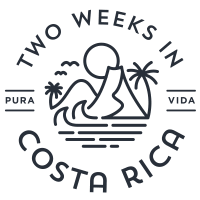
Free Booking Service
For more information and help booking, use the product links in this post and we will take care of all the arrangements. Booking through us doesn’t cost extra and helps support our website.
View all Bijagua tours
Learn more about our travel agency
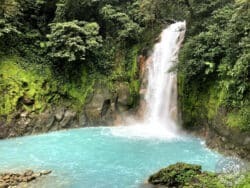 Rio Celeste Waterfall Hike (Group Tour) – From Bijagua Price: From: $55.00 +VATSelect options
Rio Celeste Waterfall Hike (Group Tour) – From Bijagua Price: From: $55.00 +VATSelect options
 Rio Celeste Waterfall Hike (Private Tour) – From Bijagua Price: From: $70.00 +VATSelect options2. Rio Celeste River Tubing Adventure
Rio Celeste Waterfall Hike (Private Tour) – From Bijagua Price: From: $70.00 +VATSelect options2. Rio Celeste River Tubing AdventureWhile swimming isn’t allowed at the waterfall in the national park, there’s still a way to dip into the Rio Celeste’s enchanting blue waters.
Just downstream you can float, by tube, along a 4 km (2.5 mile) stretch of river.
This tour blends relaxation and adventure. Part of the ride is a peaceful float that lets you soak in the stunning scenery and blue water. But other parts have you splashing and bouncing down Class I-II rapids.
 Enjoying the blue river!
Enjoying the blue river!For the best/calmest conditions, we recommend scheduling a tour during the dry season (approximately January through April) or when it hasn’t rained lately. Heavy rain can temporarily cloud the river’s vibrant blue color and make the rapids more intense.
If you’d like to try river tubing on the Rio Celeste, you can book this as part of a combo tour with the waterfall hike above. Just use our link below.
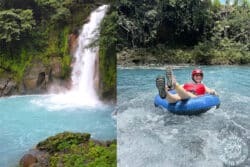 Rio Celeste Waterfall Hike & Tubing Combo – From Bijagua Price: From: $110.00 +VATSelect optionsLesser-Known Things to Do in Bijagua/Rio Celeste3. Heliconias Hanging Bridges
Rio Celeste Waterfall Hike & Tubing Combo – From Bijagua Price: From: $110.00 +VATSelect optionsLesser-Known Things to Do in Bijagua/Rio Celeste3. Heliconias Hanging BridgesFor a lesser known hanging bridge experience in Costa Rica, there is Helicionas Hanging Bridges.
Adjacent to Tenorio Volcano National Park, this property sees way less visitors than hanging bridges in places like La Fortuna or Monteverde. On some days, you might even be the only one on the trail.
The 2.5 km (1.5 mile) hike takes you through mostly virgin rainforest. It’s an easy to moderate trek with some stairs and inclines but nothing too intense. Our kids ages 5 and 9 had no problem during our last visit.
The big highlight at Heliconias is crossing three hanging bridges, each about 312 feet (95 meters) long and suspended 100 feet (30 meters) above the forest floor. These bridges may sound scary but are quite sturdy, supported by thick metal cables.
 Walking over one of the hanging bridges at Heliconias
Walking over one of the hanging bridges at HeliconiasDuring our several visits to Heliconias, we’ve encountered white-faced capuchin monkeys, toucans and other tropical birds, butterflies, lizards, and some cool insects.
One special feature our guide pointed out was a fruit tree that attracts the elusive Baird’s tapir, Central America’s largest land mammal. Tapirs are also occasionally spotted on the property (though we’ve only seen their tracks).
A local guide is nice to have for this hike as wildlife in the mature forest can be hard to spot. Click below for more info on booking through the guide we used.
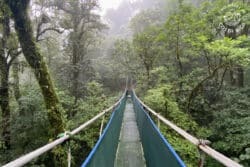 Heliconias Hanging Bridges (Private Tour) – From Bijagua Price: From: $84.00 +VATSelect options4. Frog Night Tour
Heliconias Hanging Bridges (Private Tour) – From Bijagua Price: From: $84.00 +VATSelect options4. Frog Night TourAs the sun sets over Bijagua’s lush landscape, a different side of the rainforest comes to life. A night tour lets you take part in the action.
On this unique tour, a knowledgeable local guide will lead you along flat, easy trails and around special gardens that attract various nocturnal creatures, especially frogs!
By flashlight, you’ll search for colorful residents like the iconic, red-eyed tree frog, blue-jean poison dart frog (named for its blue legs), hourglass frog, and rain frogs.
 A red-eyed tree frog
A red-eyed tree frogDuring our most recent night walk, we also spotted a sloth moving through the branches, a snail-eating snake (harmless), and some interesting insects with special adaptations for nighttime survival.
Each night offers different encounters, making every tour unique.
Tours start around 5:30 p.m., when diurnal animals are settling down and nocturnal creatures are beginning to stir. Use our link below to book. We work with a small local tour company with excellent English-speaking guides.
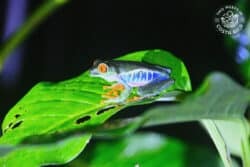 Frog Night Tour – From Bijagua Price: From: $45.00 +VATSelect options5. Bird Watching & Birding Tours
Frog Night Tour – From Bijagua Price: From: $45.00 +VATSelect options5. Bird Watching & Birding ToursBirding enthusiasts will find Bijagua to be a true paradise.
This region is considered one of Costa Rica’s premier bird-watching destinations due to its location between the Pacific and Caribbean slopes.
The mixed habitats around Bijagua (tropical rainforest, cloud forest, open pasture, plantation, and garden) draw an impressive variety of birds. Many hotels and restaurants also have feeders with fresh fruits, which attract a lot of species.
Some notable birds you may encounter include the rare Bare-necked Umbrellabird, the colorful Tody Motmot, or the Yellow-eared Toucanet.
Hummingbird enthusiasts will be excited by the possibility of spotting the Snowcap or Black-crested Coquette.
Local birding guides know the best spots to find specific target species. As an added bonus, you can often see other wildlife like sloths too.
 A Montezuma Oropendola6. Tapir Valley Nature Reserve
A Montezuma Oropendola6. Tapir Valley Nature ReserveAs the name suggests, the Tapir Valley is one of the few places in Costa Rica where you can spot the endangered Baird’s tapir.
Sightings aren’t guaranteed, but the reserve’s 220 hectares (544 acres) provide a safe haven for these large mammals.
Beyond tapirs, the reserve hosts an impressive array of wildlife, including monkeys, sloths, snakes, and hundreds of bird species.
With a large lagoon in the center, frogs are also abundant.
In fact, in 2022, a completely new species called the Tapir Valley tree frog (Tlalocohyla celeste) was discovered there. We were lucky to witness this frog being researched, just before it was formally announced.
 A newly discovered Tapir Valley tree frog
A newly discovered Tapir Valley tree frogFor more about the Tapir Valley and to read our experience taking a night tour, see our post, Tapir Valley Reserve Night Tour.
7. Ethical Sloth TourWhile the lush forests around Bijagua and the Rio Celeste provide excellent habitat for sloths, you should always use an eye of caution when selecting a tour.
As we have learned from locals, some sloths are taken from their natural homes illegally to be used in tourism projects. For more, read our post, Sloth Tours in Costa Rica: What’s Ethical?
Luckily, there is a tour in the area that takes a sustainable approach. It works directly with local farmers who know where sloths tend to hang out on their properties. This community-based model benefits both wildlife and locals, while providing authentic wildlife encounters.
When we did this tour, we were able to see a few different sloths from a safe distance and some other cool wildlife as well. Our guide also was able to show us sloths close up through his powerful scope.
 Close up of a sloth through the guide’s scope
Close up of a sloth through the guide’s scopeIt was fun to meet a local farmer and have him give us a short tour of his property.
To have a similar experience, you can book the sloth tour we did as part of the Rio Celeste hike or a cooking class (more below).
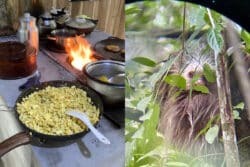 Cooking Class & Sloth Tour Combo – From Bijagua/Rio Celeste Price: From: $80.00 +VATSelect options
Cooking Class & Sloth Tour Combo – From Bijagua/Rio Celeste Price: From: $80.00 +VATSelect options
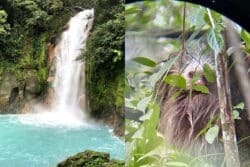 Rio Celeste Waterfall Hike & Sloth Tour – From Bijagua/Rio Celeste Price: From: $85.00 +VATSelect options8. Finca Verde
Rio Celeste Waterfall Hike & Sloth Tour – From Bijagua/Rio Celeste Price: From: $85.00 +VATSelect options8. Finca VerdeFinca Verde is another great option for wildlife viewing. This rustic lodge, organic farm, and reforestation project run by locals is just outside the main area of Bijagua.
Although they call it a farm tour, it focuses more on spotting wildlife like monkeys, sloths, birds like toucans, and frogs. They also have a small butterfly garden and snake/frog enclosure.
Guided tours are $15 per person and are offered several times a day. You can book a tour through Finca Verde’s website.
If you’re looking for an authentic place to stay in Bijagua in a beautiful setting, Finca Verde’s small ecolodge is a great spot. Our family has stayed there and enjoyed it.
 Three-toed sloth mother and baby hanging out on the property at Finca Verde9. Local Cooking Class
Three-toed sloth mother and baby hanging out on the property at Finca Verde9. Local Cooking ClassBeing rural and still developing for tourism, the Rio Celeste area is the perfect place to dive deeper into Costa Rican culture. And what better way than with food.
This hands-on cooking class offers delicious insights into traditional cuisine. A local cook will guide you through preparing classic Costa Rican dishes using farm-fresh ingredients.
What makes this experience extra special is that you are literally at the family’s home, cooking over a traditional wood-burning stove. You then get to sit down with everyone involved to enjoy the meal you’ve helped create.
 Our guide cooking over the woodstove
Our guide cooking over the woodstoveThis activity is particularly good if you’re traveling to Costa Rica with kids.
When we did it with our kids (ages 5 and 9), they were fully engaged and proud to eat what they had prepared. One especially memorable highlight was hand-grinding raw corn to make fresh tortillas. Book a cooking class with our link below.
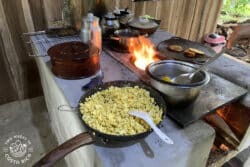 Cooking Class – From Bijagua/Rio Celeste Price: From: $45.00 +VATSelect options
Cooking Class – From Bijagua/Rio Celeste Price: From: $45.00 +VATSelect options
 Cooking Class & Sloth Tour Combo – From Bijagua/Rio Celeste Price: From: $80.00 +VATSelect options
Cooking Class & Sloth Tour Combo – From Bijagua/Rio Celeste Price: From: $80.00 +VATSelect options
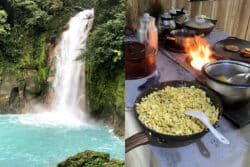 Rio Celeste Waterfall Hike & Cooking Class Combo – From Bijagua/Rio CelesteRated 5.00 out of 5 Price: From: $100.00 +VATSelect optionsConclusion
Rio Celeste Waterfall Hike & Cooking Class Combo – From Bijagua/Rio CelesteRated 5.00 out of 5 Price: From: $100.00 +VATSelect optionsConclusionBijagua offers the perfect blend of must-see natural wonders and off-the-beaten-path experiences. Whether you’re marveling at the electric blue waters of the Rio Celeste, spotting colorful frogs after dark, or connecting with the local culture through a cooking class, this understated destination delivers authentic experiences that many travelers miss.
We recommend spending at least two full days in Bijagua to experience the waterfall and a couple of additional activities without feeling rushed. Those with more time could easily spend 3-4 days.
Looking for more Costa Rica adventures? Browse our complete Things to Do section for activities all around the country.
Have a question about things to do in Bijagua (Rio Celeste) or want to share your favorite experience? Leave a comment below.Looking for more information to plan your trip? Check out these posts:Car Rental Discount: We recommend having your own vehicle for exploring the Bijagua area, as many attractions are spread out. Be sure to check out our discount through one of the most reliable companies in Costa Rica.
Bijagua: A Gateway to the Rio Celeste Waterfall – General information about the town of Bijagua, including our top picks for hotels and restaurants.
Costa Rica Activity Guides: Explore our guides in other destinations throughout Costa Rica.
The post 9 Best Things to Do in Bijagua (Rio Celeste) appeared first on Two Weeks in Costa Rica.
9 BEST Things to Do in Bijagua (Rio Celeste)
Two Weeks in Costa Rica |
Nestled in a lush valley between two dormant volcanoes lies the tranquil town of Bijagua. While many travelers visit this area for the famous Rio Celeste Waterfall, the peaceful countryside offers much more than just a stunning blue cascade.
Here are our favorite things to do in and around Bijagua and the Rio Celeste. We’ve learned the best things to do and what to avoid over our many visits to this region. Below we give the main highlights plus some lesser-known activities that showcase the area’s rich biodiversity and local culture.

No visit to Bijagua would be complete without experiencing the magical Rio Celeste Waterfall.
Often described as one of Costa Rica’s most beautiful falls, the Rio Celeste captivates visitors with its bright blue water.
The hike to this stunning waterfall takes you through Tenorio Volcano National Park.
The first leg of the trail is a relatively easy, half-hour walk. To reach the waterfall’s viewing platform, you’ll then descend a well-maintained staircase with 250 steps (and yes, you’ll need to climb back up!). The effort is totally worth it, though, as you catch your first glimpse of the blue cascade and pool below.
 The gorgeous Rio Celeste Waterfall
The gorgeous Rio Celeste WaterfallFor those interested in exploring further, the trail continues to other cool features like the tenideros. This is where the two clear streams converge and transform into the famous blue river. The second part of the hike is more challenging but worth it in our opinion.
For lots more about the Rio Celeste Waterfall hike, read our full post, Rio Celeste Waterfall: Essential Tips. We give tips on when to visit to see the blue color and important info on getting tickets.
You don’t need a guide for this hike as the trail is well maintained. But a guide can make for a better experience. The guides that we work with are locals who know the ecosystem well and can share lots of cool insights with you on the trail. If you’d like help booking a guide, just click on the product below and we can help. Learn more about our travel agency.
 Rio Celeste Waterfall Hike (Group Tour) – From Bijagua Price: From: $55.00 +VATSelect options
Rio Celeste Waterfall Hike (Group Tour) – From Bijagua Price: From: $55.00 +VATSelect options
 Rio Celeste Waterfall Hike (Private Tour) – From Bijagua Price: From: $70.00 +VATSelect options2. Rio Celeste River Tubing Adventure
Rio Celeste Waterfall Hike (Private Tour) – From Bijagua Price: From: $70.00 +VATSelect options2. Rio Celeste River Tubing AdventureWhile swimming isn’t allowed at the waterfall in the national park, there’s still a way to dip into the Rio Celeste’s enchanting blue waters.
Just downstream you can float, by tube, along a 4 km (2.5 mile) stretch of river.
This tour blends relaxation and adventure. Part of the ride is a peaceful float that lets you soak in the stunning scenery and blue water. But other parts have you splashing and bouncing down Class I-II rapids.
 Enjoying the blue river!
Enjoying the blue river!For the best/calmest conditions, we recommend scheduling a tour during the dry season (approximately January through April) or when it hasn’t rained lately. Heavy rain can temporarily cloud the river’s vibrant blue color and make the rapids more intense.
If you’d like to try river tubing on the Rio Celeste, you can book this as part of a combo tour with the waterfall hike above.
 Rio Celeste Waterfall Hike & Tubing Combo – From Bijagua Price: From: $110.00 +VATSelect optionsLesser-Known Things to Do in Bijagua/Rio Celeste3. Heliconias Hanging Bridges
Rio Celeste Waterfall Hike & Tubing Combo – From Bijagua Price: From: $110.00 +VATSelect optionsLesser-Known Things to Do in Bijagua/Rio Celeste3. Heliconias Hanging BridgesFor a lesser known hanging bridge experience in Costa Rica, there is Helicionas Hanging Bridges.
Adjacent to Tenorio Volcano National Park, this property sees way less visitors than hanging bridges in places like La Fortuna or Monteverde. On some days, you might even be the only one on the trail.
The 2.5 km (1.5 mile) hike takes you through mostly virgin rainforest. It’s an easy to moderate trek with some stairs and inclines but nothing too intense. Our kids ages 5 and 9 had no problem during our last visit.
The big highlight at Heliconias is crossing three hanging bridges, each about 312 feet (95 meters) long and suspended 100 feet (30 meters) above the forest floor. These bridges may sound scary but are quite sturdy, supported by thick metal cables.
 Walking over one of the hanging bridges at Heliconias
Walking over one of the hanging bridges at HeliconiasDuring our several visits to Heliconias, we’ve encountered white-faced capuchin monkeys, toucans and other tropical birds, butterflies, lizards, and some cool insects.
One special feature our guide pointed out was a fruit tree that attracts the elusive Baird’s tapir, Central America’s largest land mammal. Tapirs are also occasionally spotted on the property (though we’ve only seen their tracks).
A local guide is nice to have for this hike as wildlife in the mature forest can be hard to spot. Click below for more info on booking through the guide we used.
 Heliconias Hanging Bridges (Private Tour) – From Bijagua Price: From: $84.00 +VATSelect options4. Frog Night Tour
Heliconias Hanging Bridges (Private Tour) – From Bijagua Price: From: $84.00 +VATSelect options4. Frog Night TourAs the sun sets over Bijagua’s lush landscape, a different side of the rainforest comes to life. A night tour lets you take part in the action.
On this unique tour, a knowledgeable local guide will lead you along flat, easy trails and around special gardens that attract various nocturnal creatures, especially frogs!
By flashlight, you’ll search for colorful residents like the iconic, red-eyed tree frog, blue-jean poison dart frog (named for its blue legs), hourglass frog, rain frogs, and fascinating glass frog whose transparent belly reveals its internal organs.
 A red-eyed tree frog
A red-eyed tree frogDuring our most recent night walk, we also spotted a sloth moving through the branches, a snail-eating snake (harmless), and some interesting insects with special adaptations for nighttime survival.
Each night offers different encounters, making every tour unique.
Tours start around 5:30 p.m., when diurnal animals are settling down and nocturnal creatures are beginning to stir.
 Frog Night Tour – From Bijagua Price: From: $45.00 +VATSelect options5. Bird Watching & Birding Tours
Frog Night Tour – From Bijagua Price: From: $45.00 +VATSelect options5. Bird Watching & Birding ToursBirding enthusiasts will find Bijagua to be a true paradise.
This region is considered one of Costa Rica’s premier bird-watching destinations due to its location between the Pacific and Caribbean slopes.
The mixed habitats around Bijagua (tropical rainforest, cloud forest, open pasture, plantation, and garden) attract an impressive variety of birds. Many hotels and restaurants also have feeders with fresh fruits, which attract a lot of species.
Some notable birds you may encounter include the rare Bare-necked Umbrellabird, the colorful Tody Motmot, or the Yellow-eared Toucanet.
Hummingbird enthusiasts will be excited by the possibility of spotting the Snowcap or Black-crested Coquette.
Local birding guides know the best spots to find specific target species. As an added bonus, you can often see other wildlife like sloths too.
 A Montezuma Oropendola6. Tapir Valley Nature Reserve
A Montezuma Oropendola6. Tapir Valley Nature ReserveAs the name suggests, the Tapir Valley is one of the few places in Costa Rica where you can spot the endangered Baird’s tapir.
Sightings aren’t guaranteed, but the reserve’s 220 hectares (544 acres) provide a safe haven for these large mammals.
Beyond tapirs, the reserve hosts an impressive array of wildlife, including monkeys, sloths, snakes, and hundreds of bird species.
With a large lagoon in the center, frogs are also abundant.
In fact, in 2022, a completely new species called the Tapir Valley tree frog (Tlalocohyla celeste) was discovered there. We were lucky to witness this frog being researched, just before it was formally announced.
 A newly discovered Tapir Valley tree frog
A newly discovered Tapir Valley tree frogFor more about the Tapir Valley and to read our experience taking a night tour, see our post, Tapir Valley Reserve Night Tour.
7. Ethical Sloth TourWhile the lush forests around Bijagua and the Rio Celeste provide excellent habitat for sloths, you should always use an eye of caution when selecting a tour.
As we have learned from locals, some sloths are taken from their natural homes illegally to be used in tourism projects. For more, read our post, Sloth Tours in Costa Rica: What’s Ethical?
Luckily, there is a tour in the area that takes a sustainable approach. It works directly with local farmers who know where sloths tend to hang out on their properties. This community-based model benefits both wildlife and locals, while providing authentic wildlife encounters.
When we did this tour, we were able to see a few different sloths from a safe distance and some other cool wildlife as well. Our guide also was able to show us sloths close up through his powerful scope.
 Close up of a sloth through the guide’s scope
Close up of a sloth through the guide’s scopeIt was fun to meet a local farmer and have him give us a short tour of his property.
To have a similar experience, you can book the sloth tour we did as part of the Rio Celeste hike or a cooking class (more below).
 Cooking Class & Sloth Tour Combo – From Bijagua/Rio Celeste Price: From: $80.00 +VATSelect options
Cooking Class & Sloth Tour Combo – From Bijagua/Rio Celeste Price: From: $80.00 +VATSelect options
 Rio Celeste Waterfall Hike & Sloth Tour – From Bijagua/Rio Celeste Price: From: $80.00 +VATSelect options8. Finca Verde
Rio Celeste Waterfall Hike & Sloth Tour – From Bijagua/Rio Celeste Price: From: $80.00 +VATSelect options8. Finca VerdeFinca Verde is another great option for wildlife viewing. This rustic lodge, organic farm, and reforestation project run by locals is just outside the main area of Bijagua.
Although they call it a farm tour, it focuses more on spotting wildlife like monkeys, sloths, birds like toucans, and frogs. They also have a small butterfly garden and snake/frog enclosure.
Guided tours are $15 per person and are offered several times a day. You can book a tour through Finca Verde’s website.
If you’re looking for an authentic place to stay in Bijagua in a beautiful setting, Finca Verde’s small ecolodge is a great spot. Our family has stayed there and enjoyed it.
 Three-toed sloth mother and baby hanging out on the property at Finca Verde9. Local Cooking Class
Three-toed sloth mother and baby hanging out on the property at Finca Verde9. Local Cooking ClassBeing rural and still developing for tourism, the Rio Celeste area is the perfect place to dive deeper into Costa Rican culture. And what better way than with food.
This hands-on cooking class offers delicious insights into traditional cuisine. A local cook will guide you through preparing classic Costa Rican dishes using farm-fresh ingredients.
What makes this experience extra special is that you are literally at the family’s home, cooking over a traditional wood-burning stove. You then get to sit down with everyone involved to enjoy the meal you’ve helped create.
 Our guide cooking over the woodstove
Our guide cooking over the woodstoveThis activity is particularly good if you’re traveling to Costa Rica with kids.
When we did it with our kids (ages 5 and 9), they were fully engaged and proud to eat what they had prepared. One especially memorable highlight was hand-grinding raw corn to make fresh tortillas.
 Cooking Class – From Bijagua/Rio Celeste Price: From: $45.00 +VATSelect options
Cooking Class – From Bijagua/Rio Celeste Price: From: $45.00 +VATSelect options
 Cooking Class & Sloth Tour Combo – From Bijagua/Rio Celeste Price: From: $80.00 +VATSelect optionsConclusion
Cooking Class & Sloth Tour Combo – From Bijagua/Rio Celeste Price: From: $80.00 +VATSelect optionsConclusionBijagua offers the perfect blend of must-see natural wonders and off-the-beaten-path experiences. Whether you’re marveling at the electric blue waters of the Rio Celeste, spotting colorful frogs after dark, or connecting with the local culture through a cooking class, this understated destination delivers authentic experiences that many travelers miss.
We recommend spending at least two full days in Bijagua to experience the waterfall and a couple of additional activities without feeling rushed. Those with more time could easily spend 3-4 days. Be sure to check out our full guide to Bijagua for more information.
Have a question about things to do in Bijagua/Rio Celeste or want to share your favorite experience? Leave a comment below.Looking for more information to plan your trip? Check out these posts:Costa Rica Car Rental Discount: We recommend having your own vehicle for exploring the Bijagua area, as many attractions are spread out. Be sure to check out our discount through one of the most reliable companies in Costa Rica.
Packing for Costa Rica: Being comfortable on the trail means packing right. See what we recommend for Costa Rica’s many microclimates.
Bijagua: A Gateway to the Rio Celeste Waterfall – Our top accommodation picks for every budget.
Costa Rica Activity Guides: Explore our guides in other destinations throughout Costa Rica.
The post 9 BEST Things to Do in Bijagua (Rio Celeste) appeared first on Two Weeks in Costa Rica.
January 24, 2025
Getting Mail and Packages in Costa Rica
Two Weeks in Costa Rica |
In this series of posts, we answer common Costa Rica questions. Today, we’re talking about something that confuses many people planning to stay long-term: how to receive mail and packages in Costa Rica. We’ll share what we’ve learned about the options available and what works best.

“My husband and I plan to live in Costa Rica for 1 year. We’re not opposed to living there longer, it’s just that we have agreed, for now, to commit to 1 year. We’re getting it all laid out and it’s all coming together nicely (thanks to bloggers like you :)), but I do have a question. Would you mind giving me the scoop on the postal service in Costa Rica? We will need to occasionally receive mail and packages from the U.S. We are looking to relocate to Uvita, if this helps you. Thanks for your time!”
AnswerGetting mail in Costa Rica works a lot differently from what you may be used to in the United States or Canada. Here’s some information that should help.
Mail Forwarding ServicesIf you are selling your home or don’t want to bother family or friends with checking your mail, you could consider a mail forwarding service. There are several companies in the US that will allow you to set up a new mailing address. We did this and changed our address permanently to keep receiving important tax notices, etc.
The way it works is that the mail service company will receive your mail, scan it, and send you a PDF copy by email. You can have them forward items internationally or shred things you don’t need. With the service we use, you also can store pieces of mail for a monthly fee.
Main Ways to Receive Mail and Packages in Costa RicaDuring our years living here, we’ve found there are two main ways to get mail and packages into Costa Rica.
Correos de Costa Rica (Costa Rica’s Post Office)One way to receive mail is to set up a post office box at your local Correos de Costa Rica. This is the government-run mail service. If you live in a gated community with house numbers, you may even be able to receive mail right to your doorstep, but you should still register with the office nearest to you. For rural areas where formal addresses are rare (second house past the large mango tree), a P.O. Box is more reliable.
You can easily set up a post office box with your passport. They are not very expensive in our experience (less than $100 per year).
With a P.O. Box, you can receive letters and some packages (Amazon, for example), but read the section below about what might get held up or even lost in customs.
In your case, there is no post office in Uvita, but the Uvita Information Center rents P.O. boxes and Correos delivers there.
Otherwise, the nearest post offices are in:
– Quepos (45 minutes north of Uvita)
– San Isidro de El General (45 minutes inland from Uvita)
Shipping and Forwarding CompaniesThis is usually the most convenient option for receiving packages.
There are many services in Costa Rica that will receive your packages in the US and forward them to Costa Rica for pickup. This usually takes about 1-4 weeks depending on what you order and which company you use.
We’ve tried a few of these and they have worked well. However, it can be expensive, sometimes doubling the cost of the item shipped. See more on import taxes below.
When we lived in the Uvita area (Dominical), we used a local company called Get It There Jerry several times.
Now that we live closer to Jaco, we use a company called American Export, which has offices in Alajuela, Herradura, and Quepos. We’ve been happy with them as well.
With these services, you get a mailing address in the US (usually Florida). Once they receive the package, they will send you an email asking you to submit receipts or an inventory of the items. This is so that they can calculate the import tax you’ll need to pay.
The company will then ship the package to Costa Rica (by container ship or plane), handle the customs documents and permits when necessary, and send you an invoice once it has been cleared. You can then pick up the package or arrange for delivery.
The drawback here is that you don’t exactly know what the final cost will be until everything clears customs and you also don’t know exactly when you will receive it.
Shipping costs are typically based on the size and weight of the item.
Other Options for Shipping PackagesDHL, UPS, and FedExPopular package delivery services like DHL, UPS, and FedEx deliver to Costa Rica and there are some local offices scattered around the country. If none are near you, they can deliver to a specific address (we usually choose a business we know to make it easier).
We once used DHL for an important document (letter size). We needed it rushed so we paid around $90 for two-day international delivery. Because of a holiday (Mother’s Day) and weekend, we received it in five days.
Ordering Direct from Amazon or Other WebsitesWe have used Amazon successfully in the past, having it shipped directly to our P.O. Box. You have to select the Ship to Costa Rica option when ordering. Amazon will do all the customs paperwork and estimate the taxes.
Although this sounds appealing, it can be hard to tract your package once it arrives in Costa Rica. Some of our packages were sent using Correos to the nearest post office, while others were delivered using local Costa Rica shipping companies. A lot of this depends on where you live in Costa Rica and the specific size/product that you ordered.
After having some frustration tracking down our Amazon packages, we always use a shipping company now.
Shipping Your Own Packages to Costa RicaIt’s important to remember that you usually can’t just ship a package to your Costa Rica address or P.O. Box and expect to receive it. All packages and international mail go through customs first.
If you have an undocumented package arrive, they will likely just place it on a shelf until someone comes to look for it. This means your package might get held up or even lost in customs or that you will need to go to a customs office in San Jose, Puntarenas, or Limon to claim it.
In our experience, it is much better to use a company that will handle all the paperwork.
Import TaxesAll items shipped into Costa Rica go through customs. They are taxed based on categories (e.g., electronics, books, clothing, grains, etc.).
We weren’t able to find an exact list of rates but according to the shipping company Get it There Jerry, most categories are taxed from 14% to 58%. The crazy thing is that there are almost 20,000 different categories!
In our experience, customs and shipping costs typically double the cost of the item.
Specialty ItemsKeep in mind that some specialty items like cosmetics, foods, batteries, etc. may need a special permit as well. Usually, the shipping company will have information about these items on their website but if you’re not sure, it’s a good idea to ask before ordering. Depending on the permit needed, it could get very expensive!
ConclusionAlthough getting mail in Costa Rica may seem complicated at first, you’ll find that with a little planning, it’s manageable. If you have friends or family visiting, you’ll definitely want to ask them to bring some things too, saving the hassle (and taxes) altogether!
Looking for more information about moving to Costa Rica? Check out these posts:Home Decor and Furniture Stores in San Jose, Costa Rica – Sometimes it is easier to buy things locally and pick them out by hand. This post covers some good shopping options near San Jose.
Buying a House in Costa Rica – Buying a house is stressful as it is but in a foreign country even more so. This post breaks down the process so that you know what to expect.
Living in Costa Rica Category – Browse our living in Costa Rica category for more helpful information about life in paradise.
The post Getting Mail and Packages in Costa Rica appeared first on Two Weeks in Costa Rica.
Ants in Costa Rica: Bites and Stings
Two Weeks in Costa Rica |
In this series of posts, we answer common Costa Rica travel questions. Today, we’re talking about those tiny creatures that sometimes crash beach picnics and jungle walks – ants! We’ll share what we’ve learned about the different types you might see and how to avoid unwanted encounters.

“I am allergic to red ants (fire ants) and carry an epi-pen. Just curious if there is a proliferation of red ants in Costa Rica and/or in the beach area? I would assume I would need to dress protectively if we wanted to venture into the mountains or rainforest. Your thoughts?”
AnswerCosta Rica is home to nearly 500 different ant species. Many are harmless and even more, you will never encounter on a typical vacation because they stay hidden in the forest.
That being said, some ants in Costa Rica do sting or bite. While we don’t have the exact same red fire ants found in the southern United States, we do have some that you’ll want to watch out for.
Types of Ants You Might MeetDuring our years exploring and living in Costa Rica, we’ve encountered many types of ants. Here are five important ones to know about:
Sugar AntsThese are extremely small, almost clear looking ants. They get their name because they often raid sugar dishes or other food left on the kitchen counter. They are harmless but a nuisance.
Little Fire AntsThese small black ants pack quite a punch! They’re probably the ones you’ll want to watch out for most at the beach. If you step on a nest, they will quickly come out to defend their territory. The stings hurt and then swell and itch afterward but usually only for ten minutes or so. Some people do have more of an allergic reaction and can have some swelling and discomfort for several hours.
Leafcutter AntsYou’ll see these hardworking ants carrying pieces of leaves on trails or through gardens. They’re fascinating to watch and generally leave people alone. If you step on the trail of leafcutter ants though, they can bite.
Army AntsThese ants travel in long fast-moving lines and usually mind their own business if you don’t disturb them. They are most common near forested areas but sometimes invade homes looking for food. Fun fact: They are sometimes called cleaner ants because they go around looking for dead bugs in people’s houses.
Army ants will eventually just leave when once they have finished “cleaning,” so most people leave them alone. A good trick to stop them from coming into your house is to put a towel under the door.
Bullet AntsThese big guys mostly keep to themselves in the rainforest, but they have definitely earned their name. A sting is said to equal the pain of getting shot! Swelling and pain can last for more than a day. Don’t worry, though, they are pretty rare to encounter.
Where You’ll Most Likely to Find Ants in Costa RicaIn our experience, ants are most commonly spotted in these places:
On busy beaches, especially if someone’s left food scraps or fruit peels behindCrossing hiking trails or on a trail’s edgesAround the base of trees or in rotting woodIn gardens and landscaped areasTips for Avoiding Ant EncountersHere’s what we’ve learned works best:
Keep an eye out for ant trails or nests when choosing your beach spot. Use a chair instead of sitting directly on the sand.Wear closed-toe shoes and high socks when hiking and don’t step on visible ant trails.Don’t reach into leaves or bushes; you might find ants or other surprises.Keep food sealed and clean up any crumbs right away.A Note About Ant AllergiesIf you have a known ant allergy, be sure to talk with your doctor before your trip about traveling with your epi-pen or other medications. They can give you specific advice about managing your allergy in a tropical climate.
If you have a severe allergy, also take notes about the nearest medical facilities. Notifying your guide before starting a trek is also important.
ConclusionWhile ants are definitely a part of daily life in Costa Rica, most visitors find they’re easy to avoid with a little awareness. We’ve found that using these simple precautions lets us enjoy all the amazing experiences Costa Rica has to offer – from beautiful beaches to stunning rainforests – without worrying too much about our tiny neighbors.
Have a question about ants in Costa Rica or want to add something? Leave a comment below.Looking for more Costa Rica travel tips? Check out these posts:Packing for Costa Rica: The Essentials – Besides closed toed shoes, there are many more things that will make your vacation more comfortable. Check out our detailed packing list.
Bugs, Spiders, and Snakes in Costa Rica: What to Expect – What else could you encounter on a trip? Check out this post.
Costa Rica and Mosquitoes: Tips to Prevent Zika, Dengue, and More – In this post, we cover how to stay safe from mosquito bites.
Why You Should Get Travel Insurance for Costa Rica – This post explains why it’s smart to purchase travel insurance before your visit. Not only to protect your investment but also for unexpected medical issues.
The post Ants in Costa Rica: Bites and Stings appeared first on Two Weeks in Costa Rica.
January 4, 2025
19 Unique Things to Do in La Fortuna, Costa Rica
Two Weeks in Costa Rica |
La Fortuna is Costa Rica’s activities’ capital, offering an incredible mix of things to do. Whether you want to soak in Arenal Volcano’s famous hot springs, zip line through the rainforest canopy, or spot sloths on a nature hike, there’s something for everyone. We have visited this epic destination almost a dozen times and even spent a few months living on Lake Arenal. In this post, we’ll share our favorite things to do in La Fortuna. We’ll cover popular attractions and some hidden gems that will take you off the tourist trail.

We always recommend a guided volcano hike as one of the first things to do in La Fortuna. That way, you’ll learn about the history of the volcano and its eruptions, while gaining an appreciation of the rainforest around you. This knowledge will make you enjoy the rest of your activities even more.
El Silencio Trail Volcano HikeOur favorite pick for a volcano tour is Mirador El Silencio Trail because it is less crowded.
This hike takes you through pristine rainforest to view old lava flows from past eruptions. At a lookout, you’ll enjoy stunning views of Arenal Volcano in front of you as well as the Green Lagoon and Lake Arenal below.
 View of Arenal Volcano from Mirador El Silencio
View of Arenal Volcano from Mirador El SilencioThe trail is easy to moderate in difficulty, making it perfect for most people.
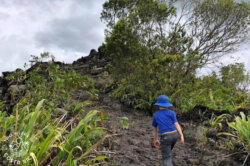
Arenal Volcano – El Silencio Trail (Group Tour) – From La Fortuna
Price: From: $61.00 +VAT
Select options

Arenal Volcano – El Silencio Trail (Private Tour) – From La FortunaRated 5.00 out of 5
Price: From: $110.00 +VAT
Select options
This is a challenging and little-known adventure that we recently enjoyed (without the kids).
The Ultimate Jungle Hike climbs through gorgeous primary rainforest to an elevation of about 1,640 feet (500 meters). Along the way, you may spot toucans, monkeys, frogs, and snakes. You’ll also stop at a hidden waterfall and refreshing swimming hole in the middle of the jungle.
 Swimming hole on the Ultimate Jungle Hike
Swimming hole on the Ultimate Jungle HikeThe four-mile (6.5 km) trek is rustic and often muddy, but worth it.
After working up an appetite, you’ll head to a local restaurant and make homemade empanadas alongside locals.
Good physical condition is required for this one (we were a bit sore after!)
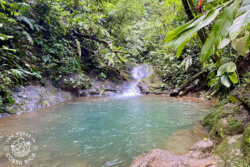
Ultimate Jungle Hike – From La Fortuna
Price: From: $85.00 +VAT
Select options
Booking Note: Like our articles? Help support our site by booking your tours with us. We’ve added products to this post to make the process easy. Booking through us costs the same (or sometimes less). We use trusted operators that we’ve built strong relationships with throughout our 10+ years in business. Thanks for your support! Read more about us.
WaterfallsLa Fortuna WaterfallLa Fortuna Waterfall is one of the main attractions in town. This is an easy activity to pair with something else since it is close to the downtown and you only need an hour or two to visit.
The gorgeous 230-foot (70 meter) waterfall is at the bottom of about 500 well-maintained stairs that cut right through the jungle. Once at the base, you’ll feel the breeze coming off the waterfall and get some great pictures. You also can swim in the natural pool as long as the currents aren’t too powerful.
 The gorgeous La Fortuna WaterfallRio Celeste Waterfall
The gorgeous La Fortuna WaterfallRio Celeste WaterfallLocated about 1.5 hours from La Fortuna, this stunning bright-blue waterfall is well worth the journey.
During the hike, you can visit the main falls, Blue Pool (Pozo Azul), and the spot where the river naturally turns from clear to blue.
The first part of the hike is easy to moderate (with lots of stairs down to the waterfall). The second part is a bit harder and can be muddy/slippery. We recommend sturdy hiking shoes.
Read our post, the Enchanting Rio Celeste, for more information.
 Rio Celeste WaterfallHot Springs
Rio Celeste WaterfallHot SpringsOne of La Fortuna’s most unique attractions is the natural hot springs. These are heated by the volcano’s geothermal activity. After trying many hot spring resorts in the area, we have two top recommendations.
Ecotermales Hot SpringsOur favorite choice for a peaceful soak is Ecotermales. This property offers an intimate atmosphere that’s perfect for relaxation. They limit daily visitors to around 100, ensuring it never feels too crowded.
 One of the pools at Ecotermales Hot Springs
One of the pools at Ecotermales Hot SpringsSeven pools of varying temperatures (90°F to 106°F) are beautifully spread out among tropical gardens. Attentive staff can bring drinks right to you while you unwind. Lunch or dinner is available at the onsite restaurant too.
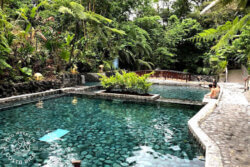
Ecotermales Hot Springs (Entrance Only) – From La Fortuna
Price: From: $43.00 +VAT
Select options

Ecotermales Hot Springs (with Meal) – From La FortunaRated 5.00 out of 5
Price: From: $69.00 +VAT
Select options
Looking for more action? Baldi Hot Springs Resort is perfect for families and those seeking a livelier atmosphere.
This large property and hotel has 25 thermal pools, including exciting elements like waterslides and sauna caves. Kids love the special children’s area with splash zones and waterslides, while adults can enjoy the swim-up bars.
 Baldi’s waterslide and kids’ splash area
Baldi’s waterslide and kids’ splash areaThe ambiance at Baldi is upbeat, especially at night when the pools are lit up and music is playing. While it’s more commercial than Ecotermales, it’s a good choice if you’re visiting with active children or want more excitement.
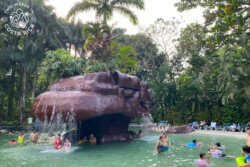
Baldi Hot Springs (Entrance Only) – From La Fortuna
Price: From: $41.00 +VAT
Select options

Baldi Hot Springs (with Meal) – From La Fortuna
Price: From: $61.00 +VAT
Select options
For a more authentic and rustic experience, locals and adventurous travelers head to the free hot springs across from Tabacon Resort.
Here, you’ll find natural thermal pools right in the riverbed, surrounded by jungle. While these springs lack the amenities of the resorts, they offer a genuine, peaceful soak in nature.
Look for the yellow gate on the right side of the road when heading from La Fortuna towards Lake Arenal.
Epic AdventuresZip liningLa Fortuna offers several zip-line experiences depending on your comfort level. Two that we love are Sky Adventures and Arenal Ecoglide.
 Zip line fun!
Zip line fun!Sky Adventures is perfect for thrill-seekers as it has the area’s fastest (and highest) lines. Starting with a scenic gondola ride to the first platform, you’ll coast down seven cables. The course includes two impressively long runs with panoramic volcano, rainforest, and lake views.
For first-timers or anyone feeling a bit nervous, we recommend Ecoglide instead. Their unique double-cable system prioritizes safety, and patient guides make it perfect for beginners. We’ve had clients go who are in their 80s and kids as young as 2 (tandem with a guide).
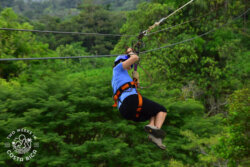
Arenal Ecoglide Family-Friendly Zip Lining – From La FortunaRated 5.00 out of 5
Price: From: $74.00 +VAT
Select options
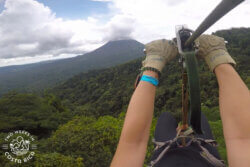
Sky Adventures Zipline (High Adrenalin) – From La Fortuna
Price: From: $93.00 +VAT
Select options
One of the most popular activities in La Fortuna for thrill seekers is waterfall rappelling.
This tour includes rappels down three waterfalls and a rock wall. They range from 40 to 165 feet (12-50 meters). There’s also an exciting “Monkey Drop” where you zip out before dropping into a refreshing pool. Safety is a priority with guides stationed at both top and bottom of each descent.
 Waterfall rappelling
Waterfall rappellingTip: Even if you’ve never rappelled before, this activity is very beginner friendly. The tour is rated for ages 5+.
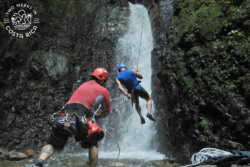
Waterfall Rappelling/Canyoning – From La Fortuna
Price: From: $105.00 +VAT
Select options
Rafting down a churning river through the dense rainforest is another must for the adventure bound. From La Fortuna, you can choose from two rivers.
The Rio Balsa (Class II-III) is our top pick for most people, combining just the right mix of excitement and scenery. It’s perfect for families and first-timers. Our son was nervous for his first time rafting, but the guides made the experience both fun and safe.
 Class II-III rapids on the Balsa River
Class II-III rapids on the Balsa RiverFor more experienced rafters, the Rio Sarapiqui (Class III-IV) delivers an adrenaline-packed ride. This river includes plenty of exciting rapids with some calmer sections to catch your breath and take in the natural beauty.
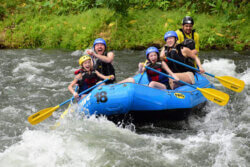
Whitewater Rafting (Class II-III) – From La Fortuna
Price: From: $75.00 +VAT
Select options
ATV tours offer an exciting way to explore La Fortuna’s backroads. You’ll zip through farmland and rainforest trails, enjoying spectacular views of Arenal Volcano along the way.
Some tours include a stop at a river with volcanic clay where you can try a natural mud bath.
Keep your eyes open for wildlife – monkeys, coatis, and tropical birds are commonly spotted.
Hanging BridgesHanging bridges or suspension bridges offer a unique way to see the rainforest canopy. There are two main choices in La Fortuna, Mistico Park or Sky Adventures.
Mistico is our top choice. The concrete path offers an easy walk through the thick rainforest. With a little luck, you also can see wildlife. On our visits, we’ve seen monkeys, snakes, birds, and even peccaries (similar to a wild boar). Mistico can get busy so plan accordingly.
 Gorgeous rainforest views at Mistico Hanging Bridges
Gorgeous rainforest views at Mistico Hanging BridgesSky Adventures has dirt trails that are easy-to-moderate in difficulty. It’s a good place to do a combo tour since they have ziplines onsite as well.
The bridges at either facility are very sturdy with strong steel cables.
For a more in-depth comparison, read our post, Hanging Bridges in Costa Rica: Where to Go for the Best Experience.
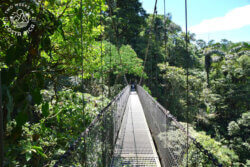
Mistico Hanging Bridges (Economical Tour) – From La Fortuna
Price: From: $44.00 +VAT
Select options

Mistico Hanging Bridges (Group Tour) – From La FortunaRated 4.00 out of 5
Price: From: $62.00 +VAT
Select options

Mistico Hanging Bridges (Private Tour) – From La Fortuna
Price: From: $99.00 +VAT
Select options

Mistico Park Hanging Bridges (Self-Guided) – From La FortunaRated 5.00 out of 5
Price: From: $32.00 +VAT
Select options

Sky Adventures Zipline-Hanging Bridges Combo – From La Fortuna
Price: From: $120.00 +VAT
Select options
A tranquil alternative to whitewater rafting is a safari float down the Peñas Blancas River. This is one of the most popular things to do in La Fortuna/Arenal.
By inflatable raft or kayak, you’ll glide along the calm water with an expert nature guide in search of wildlife along the riverbanks. You’re likely to see howler and white-faced monkeys, sloths, iguanas, basilisk lizards (also known as Jesus Christ lizards), and various tropical birds.
 Looking for wildlife on a safari float
Looking for wildlife on a safari float
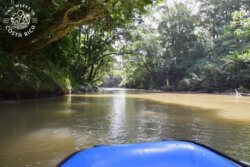
Safari Float on Penas Blancas River (Group Tour) – From La FortunaRated 5.00 out of 5
Price: From: $64.00 +VAT
Select options

Safari Float on Penas Blancas River by Raft (Private Tour) – From La Fortuna
Price: From: $105.00 +VAT
Select options
Located about 1.5 hours from La Fortuna, Caño Negro Wildlife Refuge offers one of Costa Rica’s best wetland experiences.
On a comfortable pontoon boat, you’ll cruise through this rich ecosystem spotting countless water birds like herons, kingfishers, anhinga, and occasionally roseate spoonbills. The calm waters are also home to caimans, turtles, monkeys, and sloths.
 A spider monkey on the Cano Negro boat tour
A spider monkey on the Cano Negro boat tourThe tour is on a sturdy pontoon boat so perfect for babies, young kids, or anyone with limited mobility.
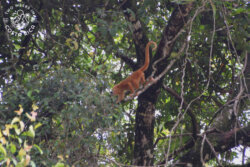
Cano Negro Wildlife Boat Tour – From La FortunaRated 4.00 out of 5
Price: From: $76.00 +VAT
Select options
Perfect for all ages and abilities, the Mariolas Trail is a flat, easy-to-navigate path just outside downtown La Fortuna. It is one of the best places to see sloths in their natural environment.
We highly recommend a guided tour. A guide will have a scope to help you see sloths, which are usually high in the trees.
 A toucan we spotted on the Sloth and Bird Tour
A toucan we spotted on the Sloth and Bird TourThis is a responsible sloth tour, which is important to keep in mind in La Fortuna/Arenal.
For more information, read our post about our experience, A Sloth and Bird Tour in La Fortuna.
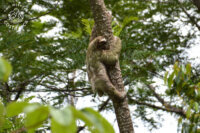
Sloth and Bird Trail (Group Tour) – From La FortunaRated 5.00 out of 5
Price: From: $69.00 +VAT
Select options

Sloth and Bird Trail (Private Tour) – From La Fortuna
Price: From: $95.00 +VAT
Select options
Perfect for families with young kids (our youngest son walked the trail at age 3), this small reserve near downtown La Fortuna offers an easy 600-meter (0.37 mile) trail through lush forest.
 A blue jean poison dart frog at Ecocentro Danaus
A blue jean poison dart frog at Ecocentro DanausThe well-maintained path at EcoCentro Danaus leads past frog ponds, a butterfly garden, and a lagoon. You may spot sloths, poison dart frogs, lizards, and various birds. The reserve also features a traditional Maleku indigenous house with local artwork. We recommend a guide to help spot wildlife.
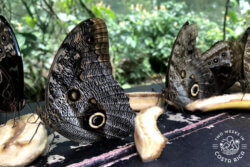
Ecocentro Danaus Easy Nature Walk – From La Fortuna
Price: From: $47.00 +VAT
Select options
This wildlife rehabilitation center provides a meaningful way to learn about Costa Rica’s animals while supporting conservation.
Located about 30 minutes from La Fortuna, Proyecto Asis helps injured wildlife return to their natural habitat. On a tour, you’ll see various animals in their sanctuary, like monkeys, sloths, parrots, and toucans. The enthusiastic guides share stories about each animal’s recovery. Volunteering opportunities are also available.
 White-faced monkeys at the wildlife rehab center, Proyecto AsisNight Tour
White-faced monkeys at the wildlife rehab center, Proyecto AsisNight TourExploring the rainforest after dark offers a completely different perspective. With a naturalist guide and flashlight in hand, you’ll discover the nocturnal side of Costa Rica’s wildlife. Frogs are especially easy to see on night tours in La Fortuna, but you may also spot snakes, interesting insects, and nocturnal mammals or sleeping birds.
 Hourglass Tree Frog
Hourglass Tree FrogNight tours start around 5:30 p.m. just as the sun goes down over the jungle.
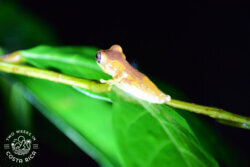
Night Walk at EcoCentro Danaus (Group Tour) – From La FortunaRated 5.00 out of 5
Price: From: $60.00 +VAT
Select options
One of our favorite cultural experiences in La Fortuna so far was the tour at North Fields Café.
Here, you’ll walk through the family’s coffee fields, learning about the entire process from bean to cup. The tour also includes a hands-on chocolate-making demonstration where you’ll get to create and taste chocolate from the raw cacao (our sons loved this).
To round out the experience, you’ll sip fresh coffee brewed in a traditional chorreador. Non-coffee drinks are available too.
 Coffee plants growing at North Fields
Coffee plants growing at North Fields

North Fields Coffee & Chocolate Tour – From La FortunaRated 5.00 out of 5
Price: From: $38.00 +VAT
Select options
For a fun, family-friendly chocolate experience, this tour is hard to beat. The entertaining guides keep everyone engaged while teaching about chocolate’s journey from bean to bar. The interactive demonstrations let you participate in making chocolate, and the unlimited tastings at the end are always a highlight.
This is an excellent activity for families with children.
 Cacao (chocolate) pods growing at Rainforest ChocolateSunset Lake Cruise
Cacao (chocolate) pods growing at Rainforest ChocolateSunset Lake CruiseFinally, for a romantic evening, nothing beats watching the sunset over Lake Arenal by boat. On this tour, you’ll enjoy waterfront views of the volcano while sipping wine and sampling a gourmet cheese plate.
As your guide navigates to different viewpoints around the lake, keep an eye out for wildlife along the shore – herons, anhingas, and occasionally monkeys can be spotted. The late afternoon light showcases the mighty volcano and makes for a memorable evening.
 Wine and charcuterie on the Lake Arenal sunset boat tour
Wine and charcuterie on the Lake Arenal sunset boat tourFor more about this tour, read our post, Lake Arenal Sunset Cruise: Wine, Cheese & Views.
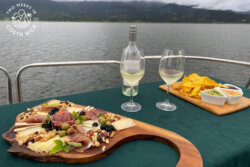
Sunset Lake Cruise with Wine & Cheese (Group Tour) – From La Fortuna
Price: From: $105.00 +VAT
Select options
While La Fortuna’s hot springs and volcano views are the main attractions, the area offers so much more. From adrenaline-pumping adventures to peaceful nature walks and cultural experiences, La Fortuna/Arenal has a little bit of everything. We recommend staying at least 3-4 days to fully experience what the area has to offer.
Pin It for Later

La Fortuna: What to Expect – Get even more info about La Fortuna. Town set up, best restaurants, and other essential tips.
La Fortuna Hotel Guide: Best places to stay for every budget.
Driving in Costa Rica: What to Know Before You Go – La Fortuna/Arenal is best explored with a rental car since it’s more spread out. Learn about the quirks of driving in Costa Rica.
Tour Bookings – For more tours in La Fortuna and other popular destinations, browse our online tour bookings page.
The post 19 Unique Things to Do in La Fortuna, Costa Rica appeared first on Two Weeks in Costa Rica.
November 8, 2024
Snorkeling Near Manual Antonio and Jaco
Two Weeks in Costa Rica |
In this series of posts, we answer common Costa Rica travel questions. Today, we’ll talk about snorkel spots near Manuel Antonio and Jaco. We’ll cover what beaches are good for snorkeling, typical conditions, tours that include snorkeling, and the availability of snorkel equipment.

“Our family will be visiting Costa Rica from July 3-11, staying in Parrita on the Pacific side. We’re wondering if there are any good snorkeling spots near Manuel Antonio or Jaco Beach. We’ve heard snorkeling inside Manuel Antonio National Park might be possible and that snorkeling at Playa Biesanz is good. Is that true?
Would you recommend going through a company to go snorkeling or is it feasible to buy/rent our own gear and go on our own?”
AnswerSnorkel ConditionsWe love snorkeling and have tried it in many places all over Costa Rica. While sometimes conditions can be awesome, overall, don’t expect the snorkeling in Costa Rica to be on par with some of the famous spots like Belize or the Caribbean islands.
You can usually see some cool fish but in general, it is hit or miss. July is the rainy season so depending on recent rains, runoff can make the water a bit cloudy if you are going right from the beach. You should still see some fish and coral but be patient. We’ll also include some ideas below that will get you out to better snorkel spots on a tour.
Snorkeling in Manuel AntonioManuel Antonio National Park and Playa Biesanz are two decent options for snorkeling in Manuel Antonio.
If you are planning to visit Manuel Antonio National Park anyway, you can bring a bathing suit and mask with you. There is a snorkeling spot at the main beach in the park (cove closest to the changing rooms/bathrooms). We’ve seen some nice fish near the rocks (left side looking out at the ocean).
There was also an interesting old fish trap out in the middle of the cove of that same beach. Story has it that it was made by the indigenous group that used to live there.
Playa Biesanz is another calmer cove for snorkeling. At mid-or-low tide, you have good access to the rocks/coral on the left/southern edge of the beach. This is the same cove that many of the catamaran tours bring you to snorkel, but they anchor farther out. When we have tried snorkeling here, we haven’t had great conditions, but it depends.
Snorkeling Near JacoFrom Parrita where you are staying, you also could travel north to find snorkeling closer to Jaco.
In Esterillos Oeste, there are some huge rock formations and big tide pools on the northern end of the beach that can be okay at mid-tide. We’ve seen cool fish, lobsters, and sea cucumbers. If the water is cloudy, though, you won’t see much.
If you drive a little north of Jaco, you can go to Playa Mantas and Playa Blanca. When conditions are calmer, Playa Blanca can have awesome snorkeling. A non-profit called Mareblu has a coral restoration project with artificial reefs there. Tons of fish congregate around them. You may even see our Two Weeks in Costa Rica donor plaque on one of those reefs, if it’s not covered by barnacles yet.
In the same spot is an underwater museum with statues of mermaids, sea turtles, fish, etc. They are all becoming slowly covered by corals, attracting small reef fish.
 Playa Blanca, near JacoSnorkel Gear Availability
Playa Blanca, near JacoSnorkel Gear AvailabilityIf you plan to snorkel right from the beach, we’d recommend bringing your own snorkel gear. You also can find simple Intex masks and snorkel sets at some variety stores or grocery stores.
We have seen snorkel equipment for rent in a few places, but it is hit or miss. Last time we were at Playa Biesanz, a vendor was renting some but nothing at the other beaches mentioned above.
Snorkel ToursAnother option is to do snorkeling as part of a tour.
The catamaran tours from Manuel Antonio like the Ocean King and Sunset Sails include about an hour to swim and snorkel. The Brisa Elegante sailboat does too.
If you want more serious snorkeling or diving, we’d recommend driving south of Manuel Antonio to Uvita (about 1.5 hours) to catch a tour to Cano Island.
That island is far offshore so the water usually stays clear. There are enormous schools of fish, and you can usually see dolphins or whales on the way out. We have even snorkeled alongside a sea turtle and seen a white-tipped reef shark while snorkeling at Cano Island.
From Jaco/Herradura, there is another full day boat tour out to a different island called Isla Tortuga. The catamaran parks on the beach for the day. You can enjoy the white-sand beach on the island and have lunch and drinks out there. They include a chance to snorkel around a large rock outcropping with a nice variety of fish.
 Tour to Tortuga IslandLooking for more information to help you plan your trip to Costa Rica? Check out these posts:
Tour to Tortuga IslandLooking for more information to help you plan your trip to Costa Rica? Check out these posts:Jaco Beaches: Where to Swim, Surf, and Just Relax – This post covers all the beach options near Jaco.
Manuel Antonio Activity Guide – Besides snorkeling, there are tons of other amazing activities in the Manuel Antonio area. Check out our list to narrow it down.
Manuel Antonio Restaurant Guide – After a few hours of snorkeling, you’ll be ready for lunch or dinner at one of these tasty picks.
Jaco: Costa Rica’s Booming Beach Town – Jaco has a main strip with tons of shops and restaurants. Learn all about the town with this destination guide.
The post Snorkeling Near Manual Antonio and Jaco appeared first on Two Weeks in Costa Rica.



